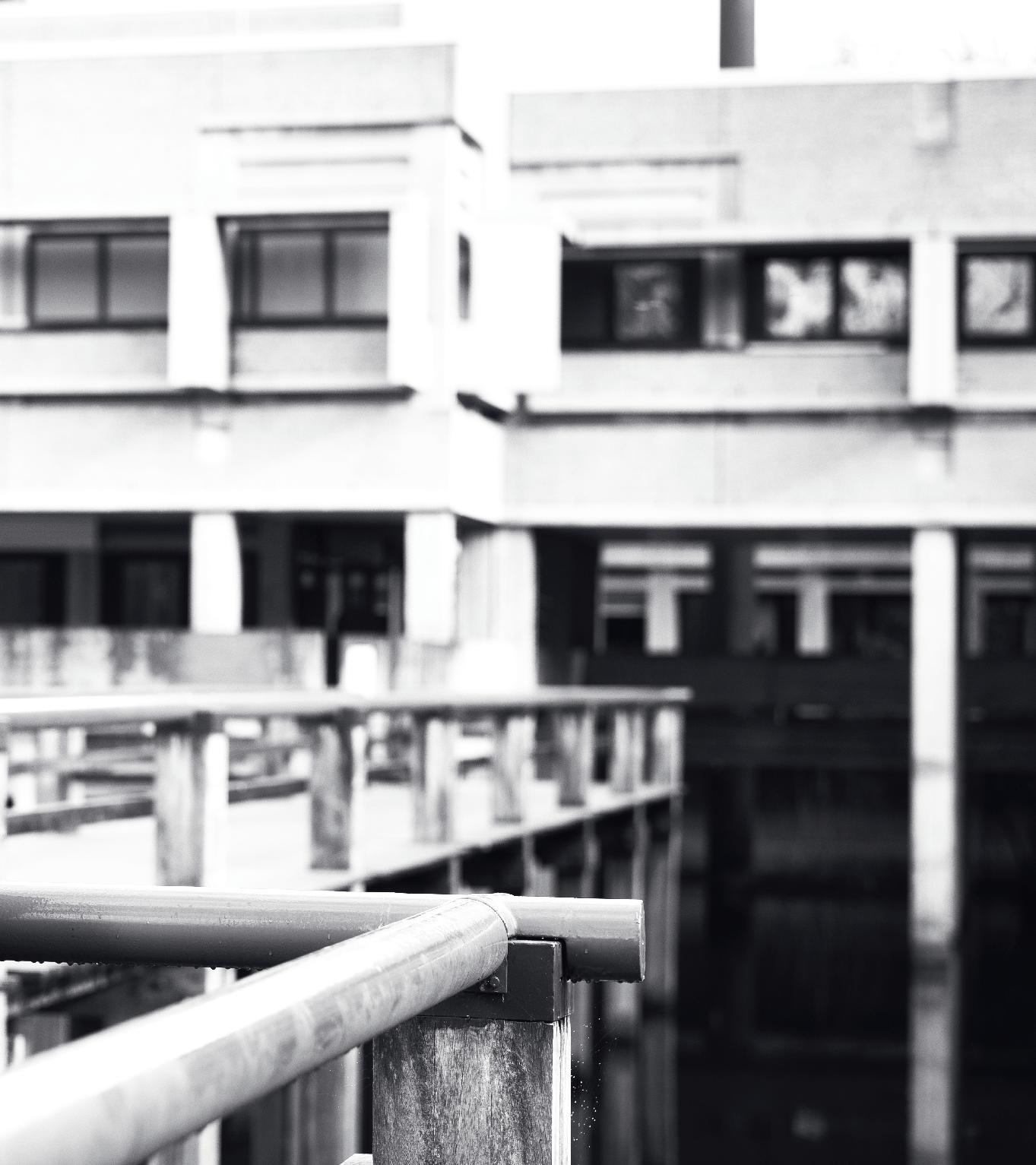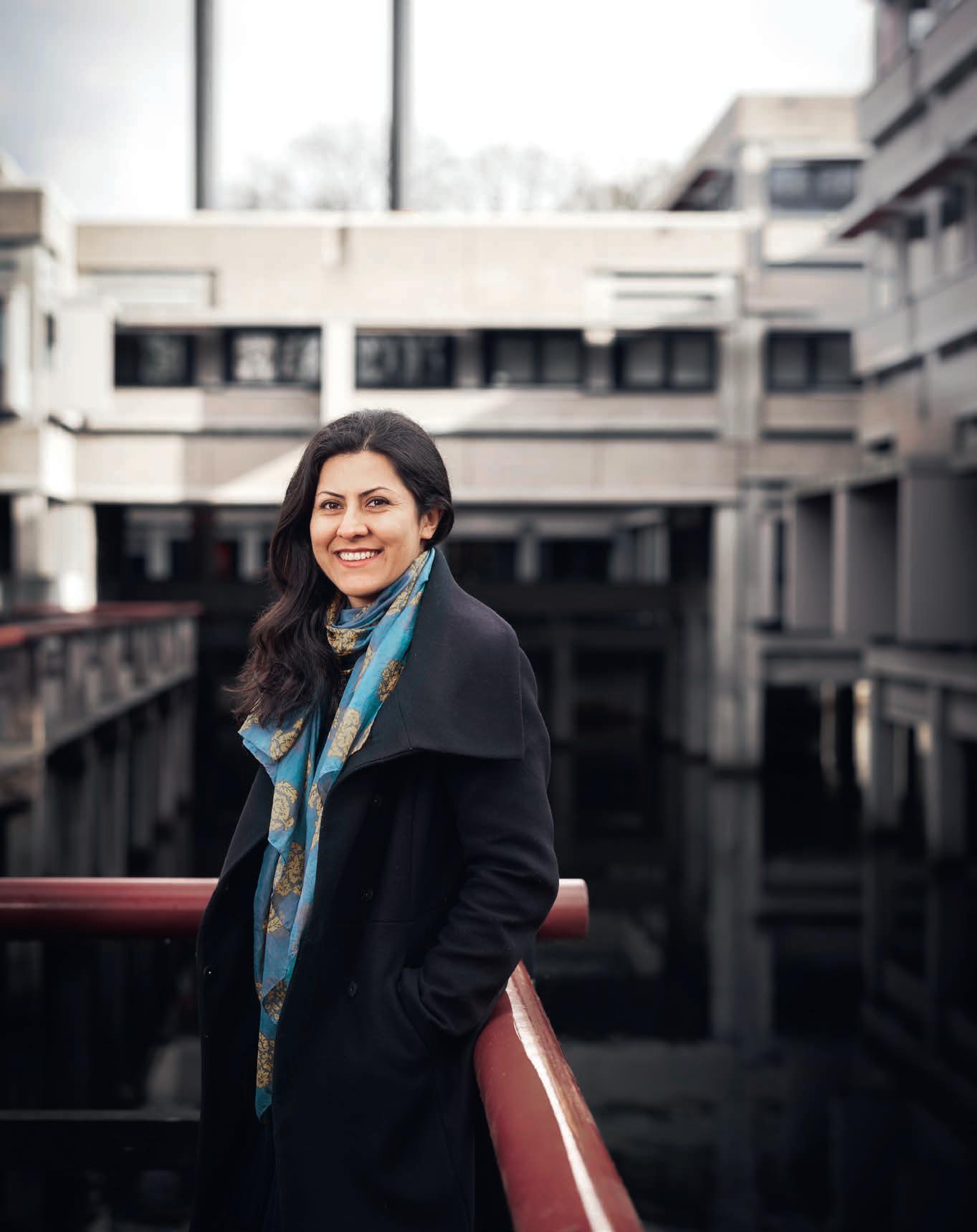
APRIL 2023 ISSUE 09 26 30 04 WHAT DO INTERNATIONAL STUDENTS BRING TO THE UT? 20 ALUMNUS BEREND BEKKER ABOUT HIS CAREER IN THE ARMY UT SCIENTISTS WORK TO MAKE AN UNTREATABLE DISEASE TREATABLE PHD RESEARCHER INVITED FOR VISIT BY KING CHARLES AZADEH AKBARI FIGHTS FOR WOMEN, LIFE AND FREEDOM 12
COLOPHON
This Campus Magazine is a co-production between U-Today, Marketing & Communications and the Alumni Office at the University of Twente.
Campus Magazine Team
Ratna Toering (publisher), Maaike Platvoet (editor-in-chief), Michaela Nesvarova (magazine coordinator), Ditta op den Dries-van Baaren (editor), Sandra Pool, Rense Kuipers, Jelle Posthuma, Stan Waning, Laurens van der Velde, Kees Wesselink, Maurice Essers, Hilde Luiten.
Other writers who contributed to this issue
Wiendelt Steenbergen, Hiska Bakker.
Photos by Rikkert Harink, Frans Nikkels, Christiaan Krouwels, David Woolfall Photography, More, UT Archive.
To change your address, opt-out from receiving the magazine or only receive an online version
See www.utwente.nl/ magazinepreferences (for UT employees)
See www.utwente.nl/ my-alumni-preferences (for UT alumni)
Or email to: alumni@utwente.nl

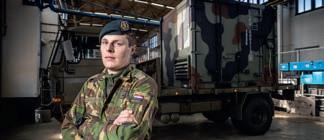
Contact & tips for editorial team utoday@utwente.nl
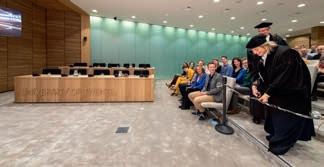
Design and realization
Jeremiah Wetzel, SchuttersMGZ (www.schuttersmagazijn.nl), Vanille Design (www.vanille.design)
Copyright notice
Copyright © 2023 All rights reserved. No part of this magazine may be reproduced or distributed without the written consent of the Campus Magazine team.
09
COLUMN BY WIENDELT STEENBERGEN
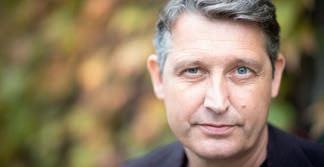

12
AZADEH AKBARI FIGHTS FOR WOMEN, LIFE AND FREEDOM
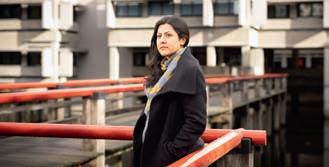
16 BACK IN THE YEAR
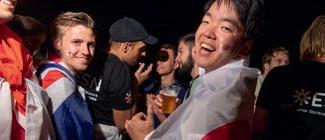
1992: The largest cocktail ever
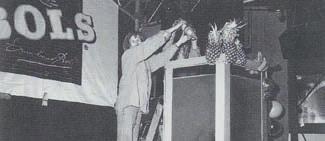
CONTENT
WHAT DO INTERNATIONAL STUDENTS BRING TO THE UT? 30 PHD STORIES CATALINA JAIME SANCHEZ 24 IN THE PICTURE HORA EST! 20 UT ALUMNUS BEREND BEKKER
HIGHLIGHTS What has happened at the UT?
INTO THE UNKNOWN QUIX QUANTUM
FIVE
ITC DEAN
VAN DER
04
10
18
23
QUESTIONS FOR
FREEK
MEER
26 MAKING AN UNTREATABLE DISEASE TREATABLE
CAMPUS
AT HOME IN TWENTE
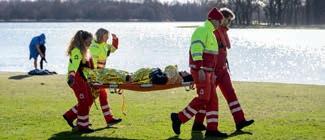
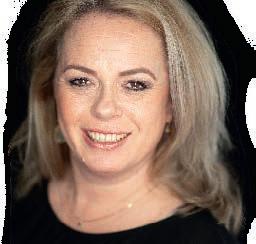
As a starting journalist at the University of Twente, more than 20 years ago, interviewing international students or employees was a special occasion for me. If a student from outside of Europe arrived on campus, we’d receive a tip and go out to talk to them. What do you think about the campus? What are your first impressions? What about the biggest cultural differences? And vice versa, it was also newsworthy when UT students flew out to exotic places for study trips, internships or exchange programmes. It always resulted in wonderful stories about their adventures.
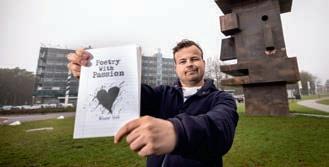

Those stories remained, but it is no longer special. Today, more than a third of UT students come from abroad. Anyone who has ever walked around the campus must have noticed this. English, Spanish, German, Dutch, Chinese, you hear it all. There is also a Global Lounge in the Bastille where people can meet, an Indonesian Food Festival to eat together, we celebrate Chinese New Year and the official language is English.
‘As a university, we’ve now reached the point where being international has become the norm,’ says Fred de Vries, Head of Internationalisation Strategy at the UT in the opening story on page 4. We wrote this story in response to the political debate about internationalisation in higher education. It is high time to ask various UT stakeholders the question: why are international students important for the university?
You can broaden that question to: what is the importance of internationalisation in general? The rather special interview with Azadeh Akbari (page 12) says a lot, we think at Campus Magazine. The originally Iranian researcher who graces the cover of this edition is a role model for many. She found her home in Twente. •
39 COLUMN BY HISKA BAKKER 32 THE ONLY STUDENT RESCUE BRIGADE IN THE NETHERLANDS 40 UT’ERS ON THE MOVE 41 ALUMNI NEWS THE DUTCH ENGINEERS ALUMNI NETWORK 42 TWENTE UNIVERSITY FUND TEAM UP FOR TALENT 44 DOUBLE INTERVIEW ‘AS A UNIVERSITY WE SERVE THE WORLD’
FOREWORD 36 UT STUDENT PUBLISHED HIS FIRST POETRY COLLECTION 04 • 2023
Maaike Platvoet Editor-in-chief of Campus Magazine
who’s who?
These were the participants in the discussion:
- Vinod Subramaniam, UT’s President of the Executive Board
- Fridtjof Otto, ATLAS student and member of University Council party UReka
- Pieter Roos, Associate Professor in the Civil Engineering programme
- Fred de Vries, Head of Internationalisation Strategy at the Strategy & Policy Department
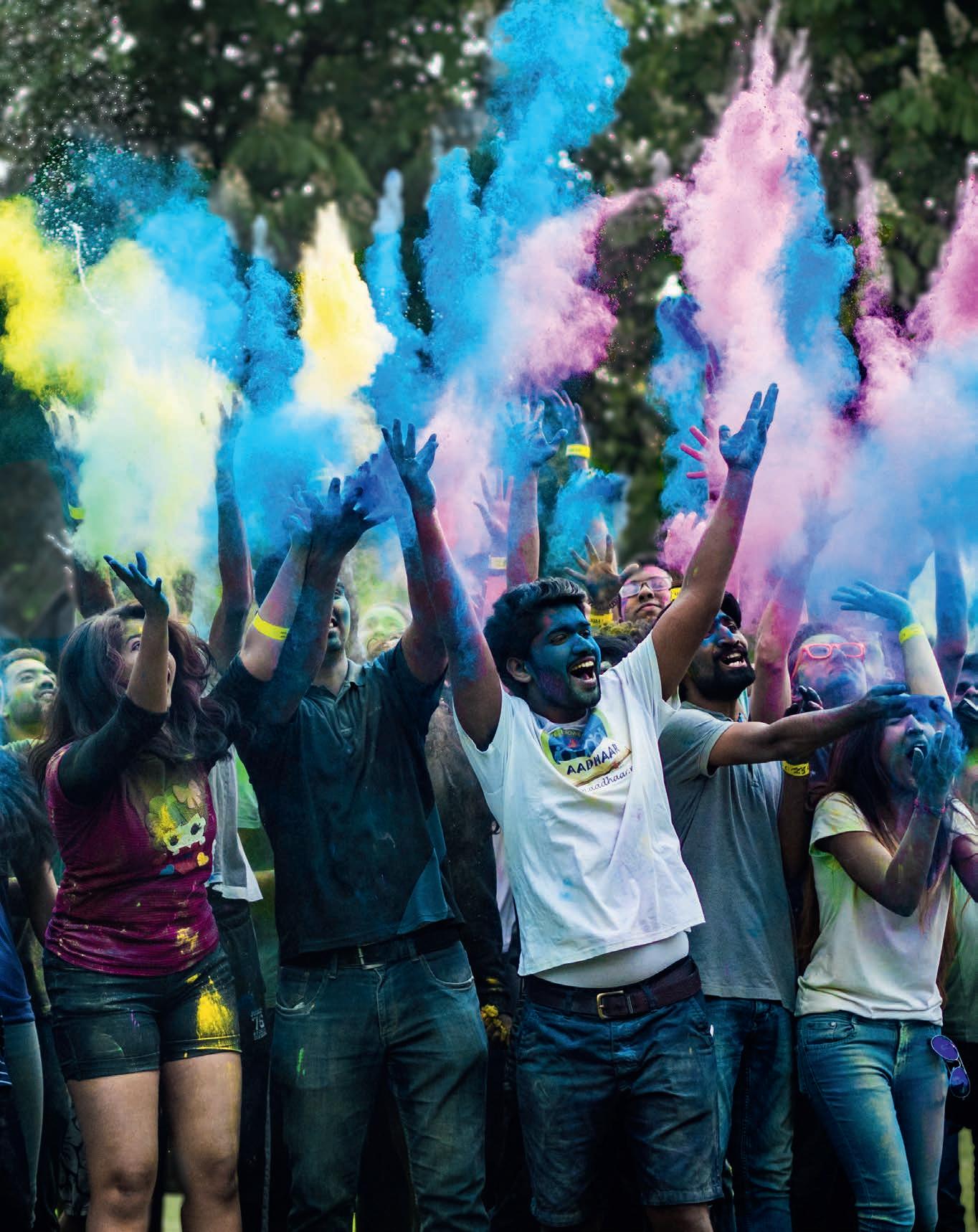
OPENING STORY Photos: UT archive Text: Jelle Posthuma & Rense Kuipers
CAMPUS
‘THE PERCEPTION THAT DUTCH STUDENTS ARE BEING CROWDED OUT BY INTERNATIONALS IS INCORRECT’

THE INTERNATIONALISATION OF UNIVERSITIES IS UNDER CLOSE SCRUTINY IN THE DUTCH PARLIAMENT. RIGHT NOW, OVER THIRTY PERCENT OF UT’S STUDENT POPULATION COMES FROM ABROAD. BUT WHAT VALUE DO THESE INTERNATIONAL STUDENTS BRING TO THE UT AND THE TWENTE REGION? BELOW, FOUR STAKEHOLDERS SHARE THEIR VIEWS BASED ON FOUR STATEMENTS.
CLASSROOM IS A GREAT ENRICHMENT FOR EVERY UT STUDENT
1. THE INTERNATIONAL
Subramaniam: ‘Absolutely. Although I prefer the term “mixed classroom”. There is no need to counterpose national to international; that’s just one dimension of diversity. Even if a group appears to be homogeneous, there can still be diversity. What about first-generation students, or a student from Amsterdam working with a student from a village? When you leave university and start working at a company or government agency, you also join a mixed team. You can’t pick and choose your colleagues.’
De Vries: ‘Exactly. Once you graduate, you encounter people from all kinds of different cultures, backgrounds and areas of expertise in your professional life. The fact that we as a university can offer this type of situation in a controlled learning environment can only be positive.’
Roos: ‘The international classroom can only be a true enrichment if students feel comfortable. Unfortunately, many international students are worried about accommodation, or experience high academic pressure because of the conditions attached to certain scholarships. This leads to stress and other well-being issues. The same applies to lecturers. An international classroom is not an enrichment if the increase in the number of students comes at the expense of lecturers’ well-being. Of course, international students are not to blame for this. Ultimately, it’s up to universities to find the right balance.’
Otto: ‘Of course there are challenges. Group work requires clear communication, and the mix of different cultures sometimes complicates that. I know of plenty of cases where things went wrong, for example when students have insufficient command of English. But there are
5 04 • 2023
two sides to every coin. UT students are well prepared to work in an international environment, where you also encounter different cultures.’
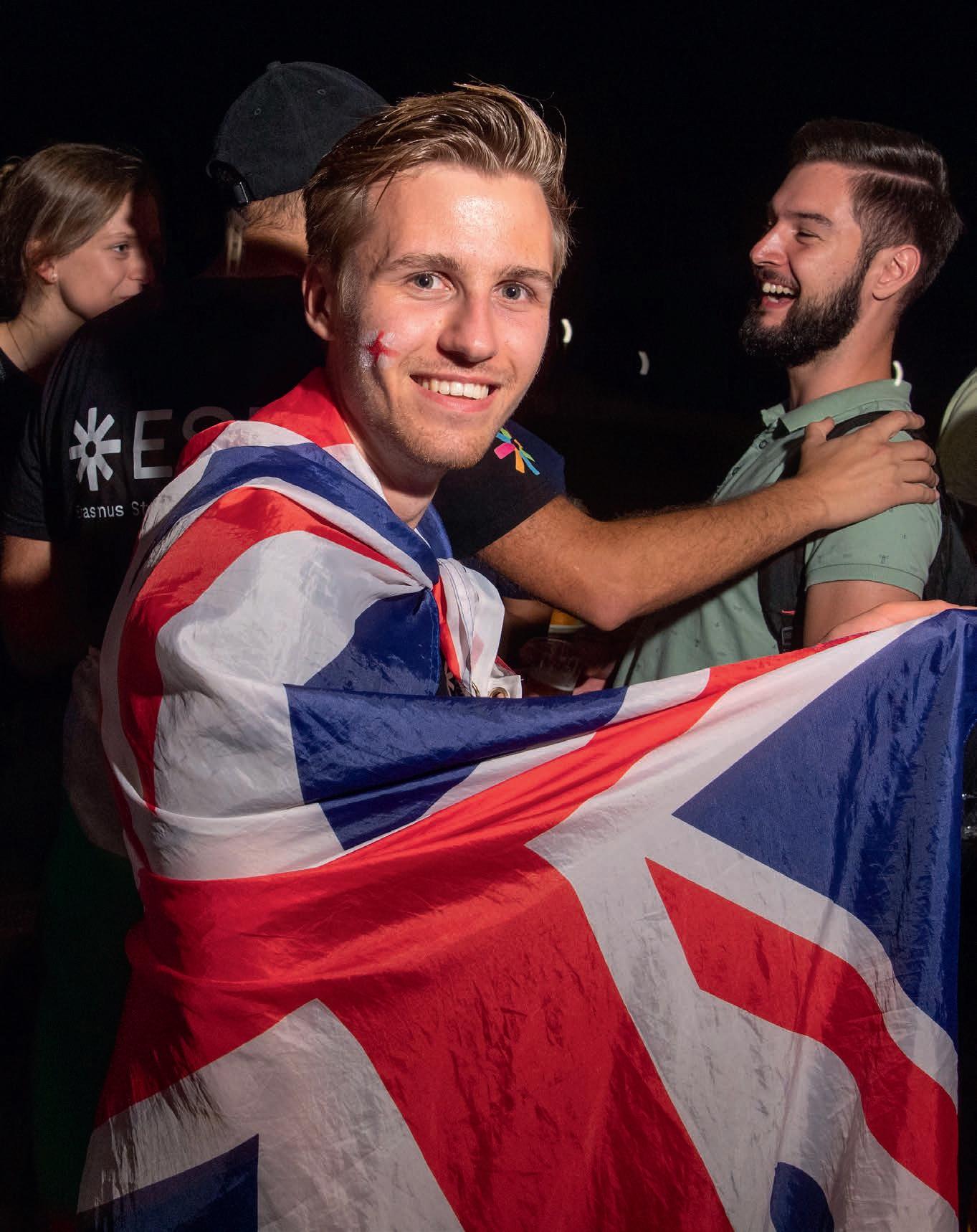
Subramaniam: ‘We should teach students more than just the subject matter. As far as I’m concerned, we start assigning students to working groups randomly in order to more effectively push students into meeting and collaborating with new people in unexpected ways.’
Otto: ‘That could be enriching, especially here in Twente, because there is a lot of group work. Learning about different cultures broadens your horizons, not just in the educational field but also beyond. And I think it’s not so much about the language per se. After all, you can have an international environment where Dutch is used as the working language. And vice versa: an exclusively English-speaking environment can be non-international in nature.’
De Vries: ‘As a university, we’ve now reached the point where international has become the norm. A strong follow-up to this would be to have the programmes take on an even more active role in deciding upon the balance and composition of their own student population and profile themselves accordingly; to determine from this local perspective what kind of student you want to educate for the Netherlands, Europe or the world.’
OPENING STORY CAMPUS
2. THE RECRUITMENT OF INTERNATIONAL STUDENTS IS MAINLY DRIVEN BY FINANCIAL CONSIDERATIONS
Otto: ‘They probably factor into it, but I don’t believe the financial considerations are the main concern. It also doesn’t help that international students are portrayed as “cash cows”. The university’s vision is to offer students an international environment.’
De Vries: ‘The Netherlands is a proud member of the European Union and ever since the Bologna Declaration was introduced, it only makes sense that we open up our education to students from abroad. I’d recommend not getting bogged down in the financial details. Instead, we should take a more holistic approach: students come here to develop themselves. We have a responsibility to help them do so, regardless of whether they want to stay here after completing their studies or not.’
Otto: ‘It’s also about academic freedom. Students should be able to choose where they want to study, especially in Europe. Promoting mobility in higher education is the starting point of the Bologna Declaration. Europe presents a wonderful playing field for students, the last thing we want to do is limit it.’
Subramaniam: ‘What’s more important than the financial aspect is the question of which student population is needed. That’s also what
the political discussion is about: what is a healthy balance? Maastricht, Groningen but also Twente are border regions, unlike a university in Amsterdam for example. That’s why it’s important not to lump all universities together. I understand the arguments of parties that are concerned about accessibility of education to Dutch students. And we should guarantee this accessibility. ‘However, the perception that Dutch students are being crowded out by internationals is incorrect.’
De Vries: ‘Dutch students have been competing for student intake for quite some time. As a relatively small university, this affects us more than others - we needed to go along with the organisation of mixed student groups in order to remain viable. But I don’t think internationalisation as a movement is what’s an issue. It’s rather some of the unwanted consequences, for example in terms of accommodation.’
Roos: ‘I’m not really qualified to form a judgement on this, but it does seem that maintaining the market share is an important factor. Still, I think it’s also rooted in genuine ideas about internationalisation. We want to be a university with an international character.’

3. THE UT SHOULD DO MORE TO FACILITATE INTERNATIONAL STUDENTS, FOR EXAMPLE IN THE AREAS OF WELL-BEING AND ACCOMMODATION
Roos: ‘I think so. On average, international students face more difficulties than Dutch students, although the latter group is also affected by the tight housing market. I believe the UT should devote more attention to this issue. As they say: in for a penny, in for a pound. We opened our doors to international students, so now we should support them as best we can. It’s not like we have to pamper them, but the UT does have a big responsibility.’
Subramaniam: ‘What doesn’t help is that we’re not allowed to build student housing ourselves under current legislation. That’s why we’re trying to address the problem through partnerships with the municipality and the regional business community. There is room to experiment within our community - both in terms of accommodation and student well-being. Fail fast, fail often. If something doesn’t work, we should move away from it. But above all, we should keep trying out new options.’
7 04 • 2023
‘ Student well-being starts with feeling welcome on campus ’
Otto: ‘Student well-being starts with feeling welcome on campus. If international students can fall back on a social network, they’re less prone to depression, stress and anxiety. This starts at the Kick-In, the introduction week where students make their first social contacts. Study associations also play an important role. The threshold for students to seek help for mental problems should be low. A contact point within a study association constitutes a much lower threshold than an official agency.’
De Vries: ‘This shouldn’t be problematised, it should be organised. That requires flexibility from lecturers and more support from student advisers or, for example, from within our information services. I think we feel that responsibility as a university and there are definitely more steps we can take in this respect. That also applies off-campus, for example, in how the region opens itself up to international students.’
Subramaniam: ‘How great would it be if we could offer accommodation to every student who enrols in a programme? To that end, we need to look beyond just the city of Enschede. Almelo is less than twenty minutes away by train. Students bring cities to life, I’ve seen it in Enschede. It’s a totally different city than it was ten years ago. The city is flourishing, and it’s thanks to the students.’
4. THE UT HAS AN IMPORTANT RESPONSIBILITY TO EDUCATE INTERNATIONAL STUDENTS FOR TWENTE’S REGIONAL BUSINESS COMMUNITY
De Vries: ‘I think of it as a two-way street. Twente has many SMEs and I understand that it can be difficult as a relatively small company to “adopt” an international graduate. What would definitely help is if companies gave more thought to creating an attractive environment for international UT students. There are plenty of engineers who thrive in a smaller, international bubble. But it also works the other way around,
especially with regard to the language. You should be able to get by perfectly well in English professionally, but the same can’t be said for informal situations, like coffee breaks. Learning the language helps you feel at home. If you come here to study, it makes perfect sense that English is the lingua franca at university. But if you want to stay here, you’d do well to master the Dutch language.’
Otto: ‘A good way to keep students in the region is to introduce them to the Dutch language and culture. One way we do this is through the minor ‘Going Dutch’, initiated by UReka. It’s also important that internationals become familiar with regional companies during their studies, for example by attending the Business Days or visiting Kennispark. The point is for international students to start envisioning a future for themselves here in Twente.’
Roos: ‘We shouldn’t distinguish between international and Dutch students. Let’s avoid labels and think of them as one whole. I think it’s important for both groups to come into contact with the regional business community.’
Subramaniam: ‘We have an important role in the region as a standard-bearer. A regional university plays a defining role in the local ecosystem, which is not the case in a city like Amsterdam, as I know from experience. Of course, there is room for improvement when it comes to students’ stay rate. So I say to the business community: put in the work, provide attractive jobs! However, as a university, we don’t just educate students for the region, but also for the country and the rest of the world. Our students remain as popular as ever due to their entrepreneurial mindset. Recently, I heard people at ASML say that UT students are very welcome guests. Not only are they well-educated, they’ve also learned to work together, in diverse teams.’ •
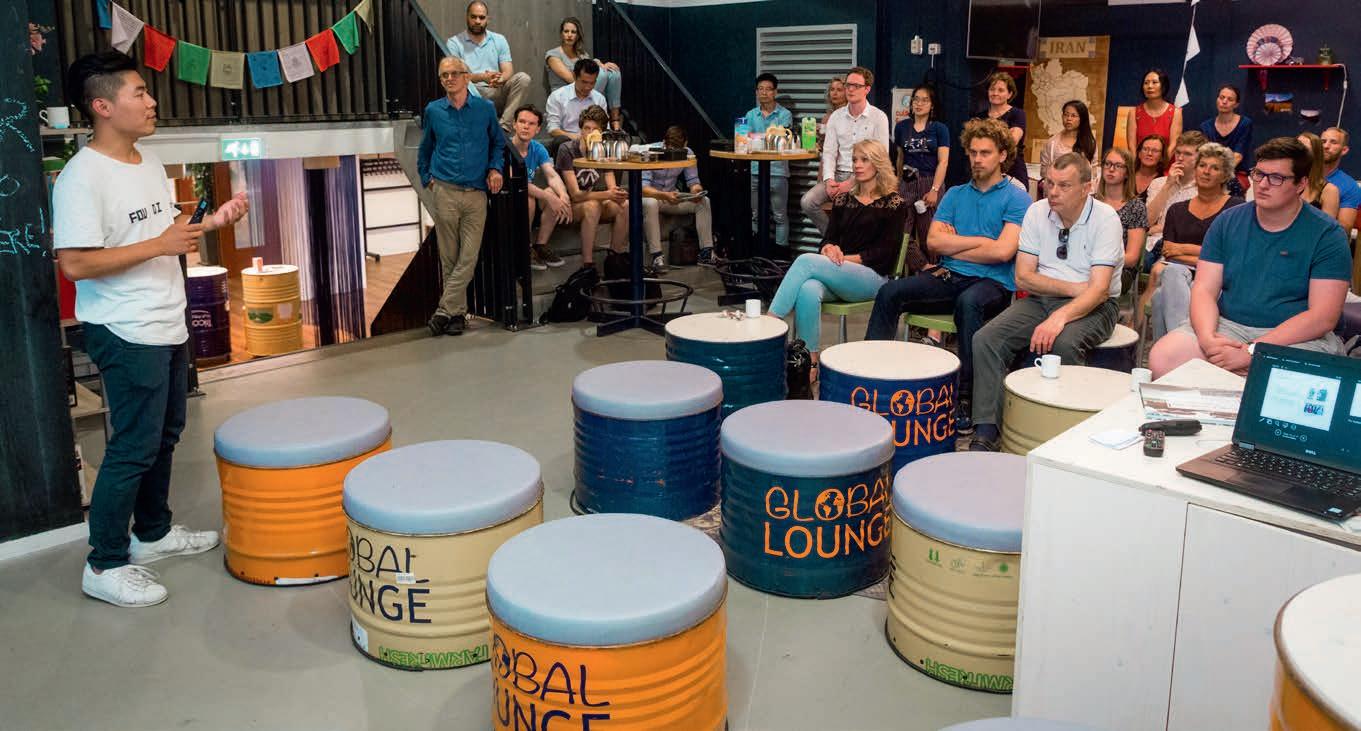
8 CAMPUS
WAYWARD DOCTOR
Since 2017, the Rector Magnificus of our university imparts the following words to young doctors immediately after they have received their degree certificates:
‘Dear learned doctor [….….] Let me congratulate you also on behalf of the university with your acquired dignity. From now on you have the right to use the title of doctor. This title implies that society can rely on the quality of your judgement, that you will act with integrity and transparency, and that you will communicate independently about the results and the social relevance of your work. Value the doctoralis as an honourable distinction and a well-deserved prerogative, but always remember the obligations imposed by it, towards the scientific community and society.’
This formula refers to a right, namely the right to use the title. The way the duties are phrased conveys both expectation and confidence.
But what is the extent of these duties? They concern ‘your work’. This can be interpreted as: the scientific work that has been done or is still being done. But it is worded in an even broader manner. Suppose that someone who got their PhD at the University of Twente blatantly betrays the aforementioned trust at a later point in time. Someone who, for example, dismisses the results of sound science as mere fables. Or who denies or trivialises the dangers looming over us. Or who spouts all kinds of improbable theories about an invisible hand controlling societal developments in order to destroy us and control the world. Or who denies the good faith of anyone in a position of responsibility who somewhat tries to steer this complex society in the right direction. This is not someone who wants to cause a stir at birthday parties or suffers from delusions. No, this person wants to gain influence over the country’s government, in a destructive way if need be.
This is all just hypothetical, and the chances of someone actually possessing all of these characteristics are, of course, extremely small. But still, what should the University of Twente do about someone who deliberately commits such grave misconduct, making a huge impact
on society? All evidence points to the fact that this person is acting in violation of the duties attached to being a doctor. Shouldn’t the university strip them of their title? That would be a fantastic statement, of course. The problem is that the young doctor doesn’t make any pledge or oath, but just listens to what the rector says, possibly already thinking about the upcoming party. Furthermore, the doctoral degree was granted on the basis of achievements that have already been accomplished. Subsequent waywardness doesn’t change that. And it is likely that this person would only benefit from losing their title.
So wouldn’t it be better to turn it into an oath or pledge? But this raises the question of who will assess whether that pledge is kept, and what the standards are. You’ll quickly find yourself on dangerous ground. The only thing the university can do is urge the young doctor to take its wise counsel to heart. And if it’s glaringly obvious that things are going wrong, the university can (should?) speak out about it publicly. Only to wonder afterwards when the first signs of waywardness started to show. •
Wiendelt Steenbergen Professor of
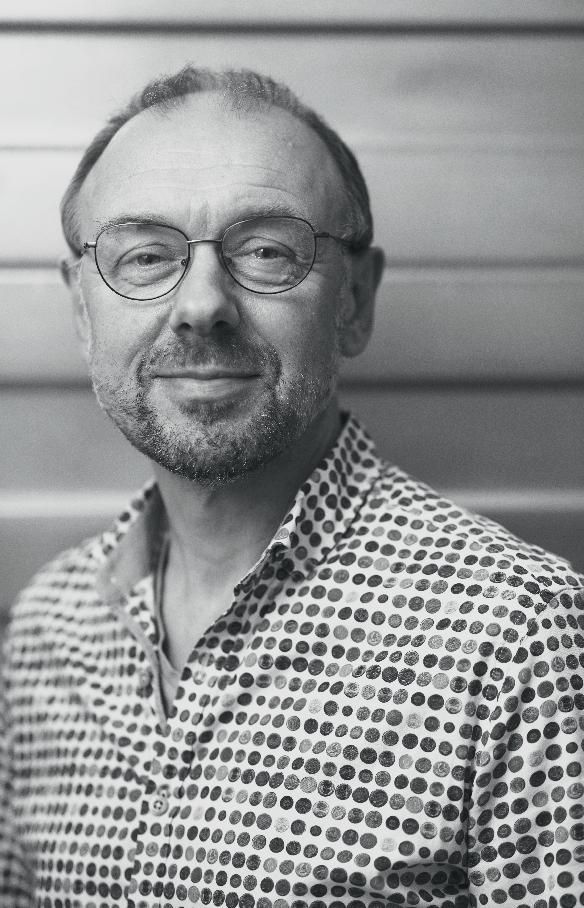
9
Biomedical Photonic Imaging
COLUMN Photo: Rikkert Harink Text: Wiendelt Steenbergen
04 • 2023
VICI GRANTS FOR THREE UT SCIENTISTS
UT scientists Christian Nijhuis, Floris Zwanenburg and Mark Huijben have received the Vici grant from the Dutch Research Council (NWO) this year. The Vici grant, worth 1.5 million euros, is one of the largest scientific grants for individuals in the Netherlands and targets senior researchers.
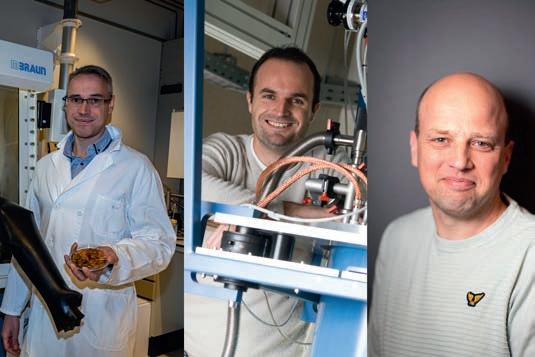
Construction of three buildings on campus will start in September. These new student houses will be located in the wooded area between the Boulevard and the athletics track near the Vrijhof and Bastille buildings. The building project is a response to the room shortage among students. The houses are divided into three complexes of three floors high and will include 117 independent studios for both Dutch and international students. The ground will be broken in September. The housing complexes are expected to be completed in the last quarter of 2024. •
NEW STUDENT HOUSES FRANS TIMMERMANS AT DIES NATALIS
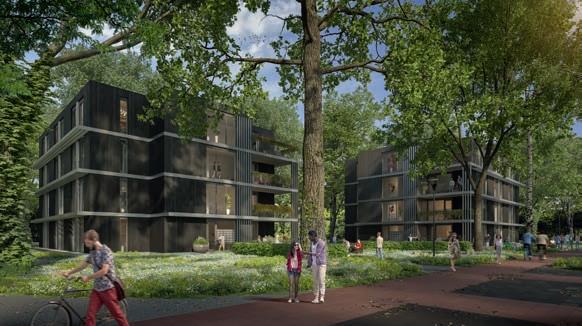
Frans Timmermans, Executive Vice-President of the European Commission, will be the keynote speaker at the Dies Natalis of the University of Twente on 12 May, 2023. The 61st Dies Natalis will focus on the challenges we face for creating a more sustainable environment. Timmermans will share his thoughts on what is necessary for the green transition, and how we should tackle the climate crisis and move to renewable energy.
The ceremony will begin at 15:00 on 12 May in the Waaier building. You can find more details about the programme and register at www.utwente.nl/dies. You have the option of attending in person, but you can also follow the Dies celebration online. •
Christian Nijhuis is professor at Hybrid Materials for OptoElectronics (Faculty of Science and Technology). He has received the grant for his research into ‘Intelligent Molecules for Brain-Like Devices’. This research aims to intelligent molecules that can mimic the computational methods of human brains.
Professor Floris Zwanenburg works at UT’s MESA+ Institute for Nanotechnology and chairs an independent research line on quantum electronics within the NanoElectronics group (Faculty of Electrical Engineering, Mathematics and Computer Science). He will use the Vici for researching ‘Single-atom quantum coherence’.
Mark Huijben, professor of Nanomaterials for Energy Conversion and Storage (Faculty of Science and Technology), has been awarded the Vici for his project ‘Superior microbatteries by tailoring interfaces for an interconnected society’. Its goal is to improve the performance of microbatteries for future wireless and autonomous applications of advanced microelectronic devices. •
10 HIGHLIGHTS
CAMPUS
EXHIBITION OF 36 KILLED UKRAINIAN STUDENTS
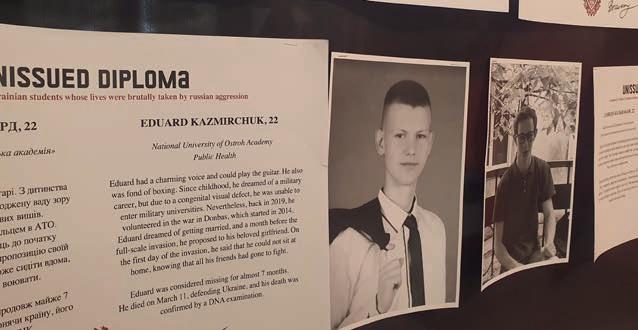
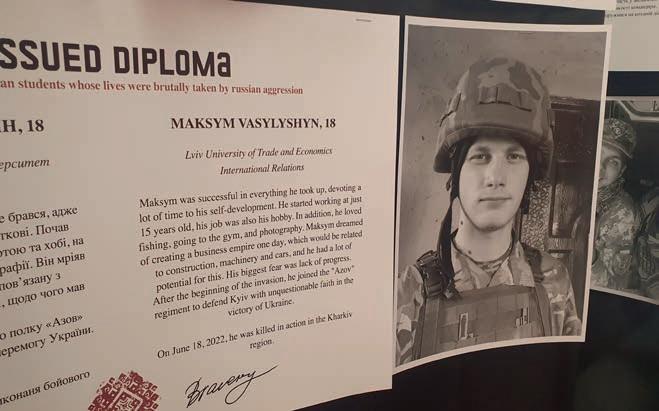
Exactly one year after the start of the war in Ukraine, the UT campus hosted an exhibition honoring killed Ukrainian students. The exhibit in the Bastille featured 36 stories of young people who will never get their diplomas because they died due to the war in their home country. The idea to tell these stories arose at the University of Toronto, and more than 45 universities worldwide joined the idea - including the UT. •
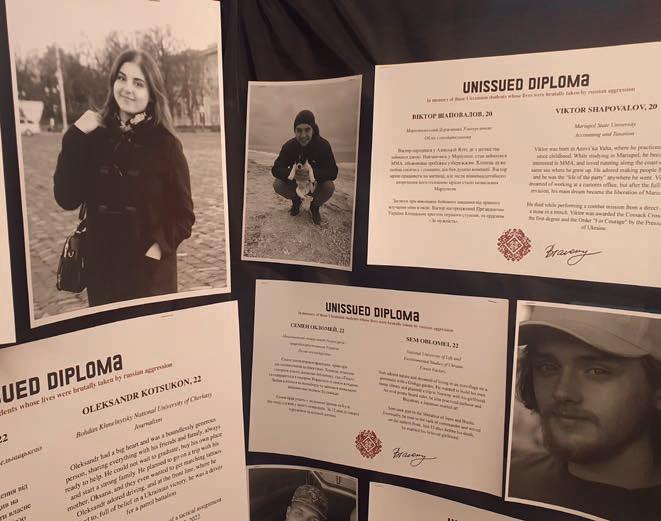
PODCAST ABOUT UT HISTORY
After the Second World War, Enschede and five other cities fought a fierce battle in order to become the third technical university of applied sciences in the Netherlands. In the end, Twente emerged as the winner. Crucial part of this decision was the Drienerlo estate, which the Enschede municipality could donate to the national government for the establishment of a campus. Shortly after the war, the estate was confiscated because the owner, Gerrit Albertus Lasonder, had been exposed as a member of NSB a Dutch Nazi political party. However, there are also persistent rumors that he helped Jews with hiding places on his estate during the war. Was Lasonder really such a bad person? How did the campus come into the hands of the government? And how did Enschede win the city battle against formidable opponents such as Deventer and Zwolle? In the new U-Today podcast we look for answers. The podcast will appear before the summer and can be listened to in your favorite podcast app or on the website www.utoday.nl . •
11 04 • 2023
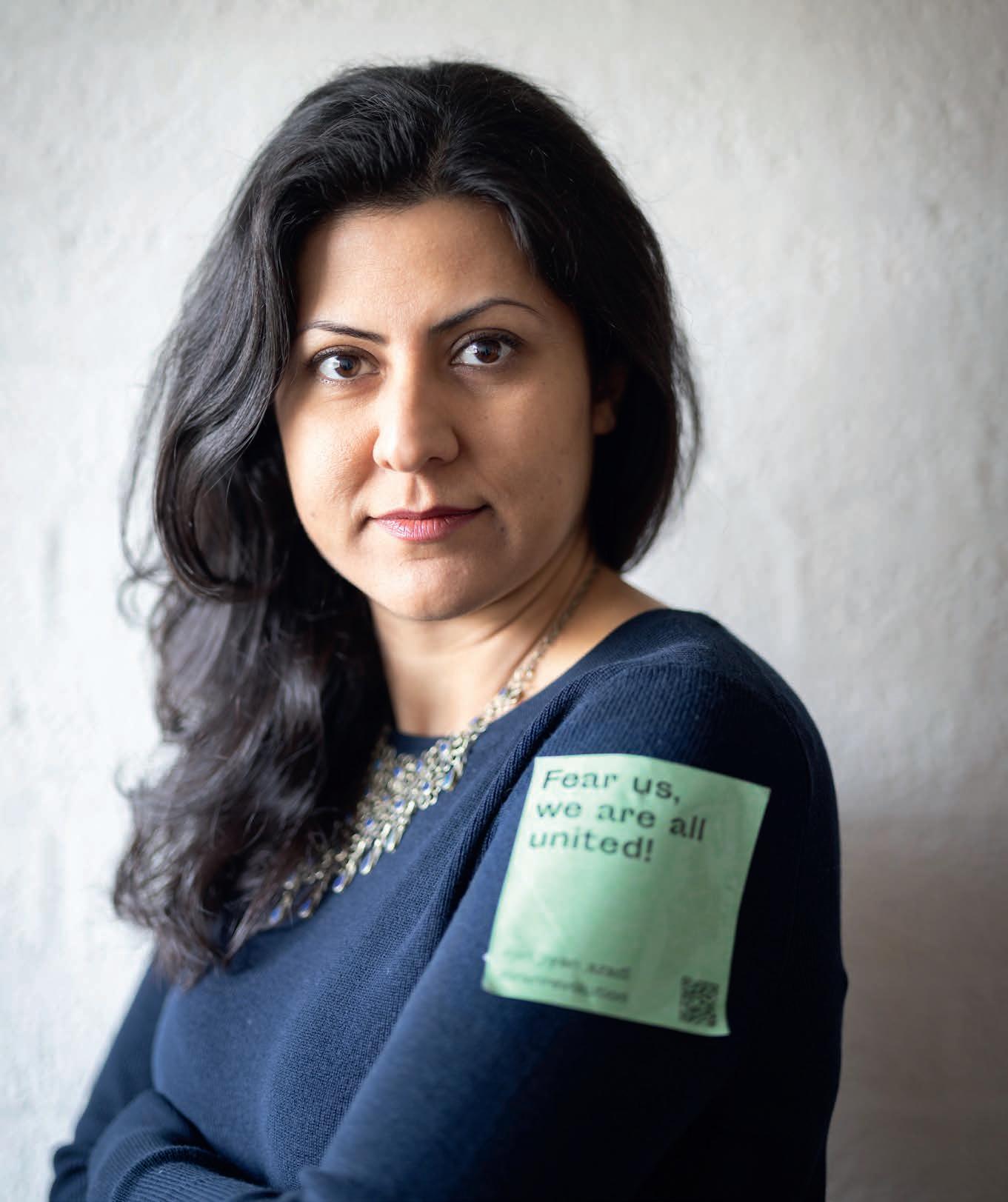
INTERVIEW
Photos: Rikkert Harink
Text: Michaela Nesvarova
CAMPUS
‘PROMOTING WOMEN’S RIGHTS IS NOT AN INTEREST – IT’S A SURVIVAL STRATEGY’
AZADEH AKBARI, ASSISTANT PROFESSOR AT THE UNIVERSITY OF TWENTE AND A FORMER JOURNALIST FROM IRAN, HAS WALKED A THIN LINE BETWEEN ACTIVISM, RESEARCH AND MEDIA HER ENTIRE LIFE. SHE HAS DEMONSTRATED NOT ONLY COURAGE, BUT AN ASTONISHING ABILITY TO FORETELL THE FUTURE. WHEN SHE STARTED HER PHD RESEARCH INTO THE USE OF SURVEILLANCE TECHNOLOGIES FOR CONTROLLING WOMEN’S CLOTHING BY THE TOTALITARIAN GOVERNMENT IN IRAN, IT WAS CONSIDERED SCI-FI. IT IS REALITY NOW.
Akbari might disagree with being called a ‘fighter’. After all, she is no longer actively involved in activism, she says. Her story reveals something different, though. Even after growing up in a country where women’s rights are not a given, and being interrogated by the Iranian government for a year due to her journalistic work, Azadeh Akbari has never stopped speaking out against unjust laws in her home country. Not to mention that her scientific research and outreach activities could be considered activism in itself. ‘When you are constantly oppressed in all aspects of your life, when you live in a hostile environment where the
patriarchy rules over you, promoting women’s rights is not an interest –it’s a survival strategy,’ she says.
This desire to change the order of things has always been there. ‘I grew up in a family with women who were very strong and intelligent, and at the same time had to fight for their basic rights,’ says the UT scientist. ‘I watched my mother fight for her right to work, because my father could forbid it. I watched my educated aunts struggle to work and fight for opportunities. I listened to their stories from a workplace
13 04 • 2023
AZADEH AKBARI FIGHTS FOR WOMEN, LIFE AND FREEDOM
where it was very common to experience sexual harassment. I had to fight for things that are very ordinary. Like my apartment. After graduating high school, I really wanted to live on my own and work, but that was completely unheard of for a young woman. I had to fight hard to make it happen.’
AUTHORITARIAN SURVEILLANCE
Before starting her career in academia, Akbari worked as a journalist in Iran for many years. Working for local and international publications, including The New York Times, she focused on women rights, children rights and crisis management in Iran. Topics not particularly favored by the Iranian government. ‘I was interrogated by Iranian intelligence for about a year in 2008 after they had revoked my license.’ A hard blow at the time, but one that eventually led her to science and to the University of Twente. ‘I started working as Media Officer for UNICEF. After years of activism and communication work, I went on to get a Master’s degree in Gender Research at London School of Economics and Political Sciences in 2010. After that I obtained my PhD in human geography from the University of Heidelberg.’
It was her PhD research that launched Akbari into international media spotlight and landed her the UT Media Award this year. ‘My research started with a tweet,’ explains the Assistant Professor. ‘It was a picture of a long line of people waiting on a street in Iran. The tweet said ‘This is not a queue for bread or milk. This is a queue to pay a fine for not wearing hijab while driving’. I immediately thought: but how do they know? How do they know who is wearing hijab in a car? Are they using traffic cameras and facial recognition? Suddenly it all clicked.’
When she proposed her PhD topic, ‘people didn’t want to believe that it was possible’, says Akbari. ‘They didn’t want to believe that the Iranian government could use artificial intelligence (AI) and CCTV cameras to identify political opposition. But they can.’ This was covered in her doctoral thesis – written before the current revelations about the extent of use of surveillance technologies. ‘I thought back to my interrogations and tapping of my mobile phone at the time and I started thinking of where and how the Iranian government used AI, machine learning and other surveillance technologies. This is all tied to national intelligence, and so there is no openly available data. Because of that, I couldn’t present any hard evidence in my thesis, but – based on publicly known outcomes – it was safe to claim that the Iranian government is using facial recognition to identify people on the street. It took around five years until officials revealed the righteousness of my claims. In 2015, when the Iranian government started rolling out the national ID cards with biometric data such as photos and finger prints, I and many other experts warned about the surveillance potential of these systems.
In September 2022, when a woman was arrested after protesting against compulsory hijab on a bus, I finally could prove that the CCTV
footage is matched with the national ID databases to arrest people. That analysis immediately made it into international headlines.’
FREE INTERNET
If this wasn’t dystopian enough, Akbari’s research also suggests that these surveillance technologies are coupled with the government’s effort to build Iranian national internet, a local internet completely separate from the global free internet. ‘A lot of effort and expertise has been put into building this national internet which cuts people off from the rest of the world,’ says the scientist. ‘This is dangerous not only for people in Iran. There are more countries with totalitarian governments in the world. If one country succeeds in building its own internet, it can change everything. Our future is digital and it’s important that everyone is connected to the free internet.’
In other words: An internet shutdown may not seem like an act of violence, but when bullets are fired at protesters and nobody is able to document it, brutality is able to flourish, as Azadeh Akbari wrote in her op-ed published in the Guardian last year, just days after massive demonstrations flooded the streets of Iran. ‘I’m sad that I was right in my predictions. As a researcher, you might see the signs but you hope that someone in power would also notice. I hoped that international organizations would do something but it took too long for them to listen to the warnings.’
BITTERSWEET
The developments in her home country and the attention she received thanks to her research made Akbari’s first year in Twente a time of contrasts. ‘After the Guardian piece was published, I went from one interview to the next. The days felt endless. Last months have been very stressful, but being in Twente has been very nice. I’ve only been here for less than a year, but I’ve received a lot of support from colleagues and management at the UT. It has been very heart-warming. In January, I also received the UT Media Award, which was a bittersweet moment for me. When the prize was being awarded, many young men in Iran were being executed. It was hard to feel happy at a time of such tragedy. On the other hand, it was very nice to see that the UT recognizes your efforts beyond academic research. I didn’t expect to feel so grateful for it. The support from the UT has been very valuable for me.’
In her position as Assistant Professor in Public Administration & Digital Transformation, Akbari is now starting a research project focused on authoritarian smart cities. She aims to study how surveillance technologies are integrated in smart city infrastructures and what this could be for the future of democracy.
Next to her research, Akbari tries to spread awareness about the use of surveillance technologies by totalitarian governments. She attends panels and public events, as well as policy making meetings. ‘I’m really happy about that. That is a level of impact that I didn’t have before,’ she says. ‘The possibility to directly influence policy making is

INTERVIEW 14 CAMPUS
very valuable. I’m also consulting the European Center for Not-for-Profit Law, a Netherlands-based NGO, to improve their guide for monitoring digitally-mediated assemblies in cooperation with the UN Special Rapporteur for Freedom of Assembly, which gives me the opportunity to translate my research to policy on a really high level.’
FINE LINE
Azadeh Akbari is certainly not afraid to speak up, despite the severity of the topic she’s dedicated her career to. ‘I’m not concerned for my safety but of course my choices have an impact on me,’ she answers the question whether she’s ever worried about the possible consequences. ‘It’s very clear to me that I can’t go back to my home country. But when it comes to my safety, I’ve received so many threats by now that I know how to handle them. As soon as you become vocal, you start receiving phishing emails, people try to hack your accounts, you receive hateful messages. I’ve also gotten questioned by Iranian government’s representatives when I was on international panels, for example. They publicly question your credibility, they challenge you and your expertise at international events for everyone to see. It’s a fine line between being an objective academic and an individual fighting for your values of freedom and democracy. It is a very fine line to walk.’
Would she have rather stayed in Iran? Would she have done her life differently? ‘No, I have no regrets,’ says the UT scientist. ‘I don’t have a home as such, but I feel like a global citizen. And I think this was always in me. Even if the situation in Iran was completely different, I’d probably still want to leave and travel. I’ve always wanted to see the world. It is not a comfortable choice for many, but I have enjoyed the journey. There is a poem by Ijeoma Umebinyuo that I think explains the life of many people like me really well:
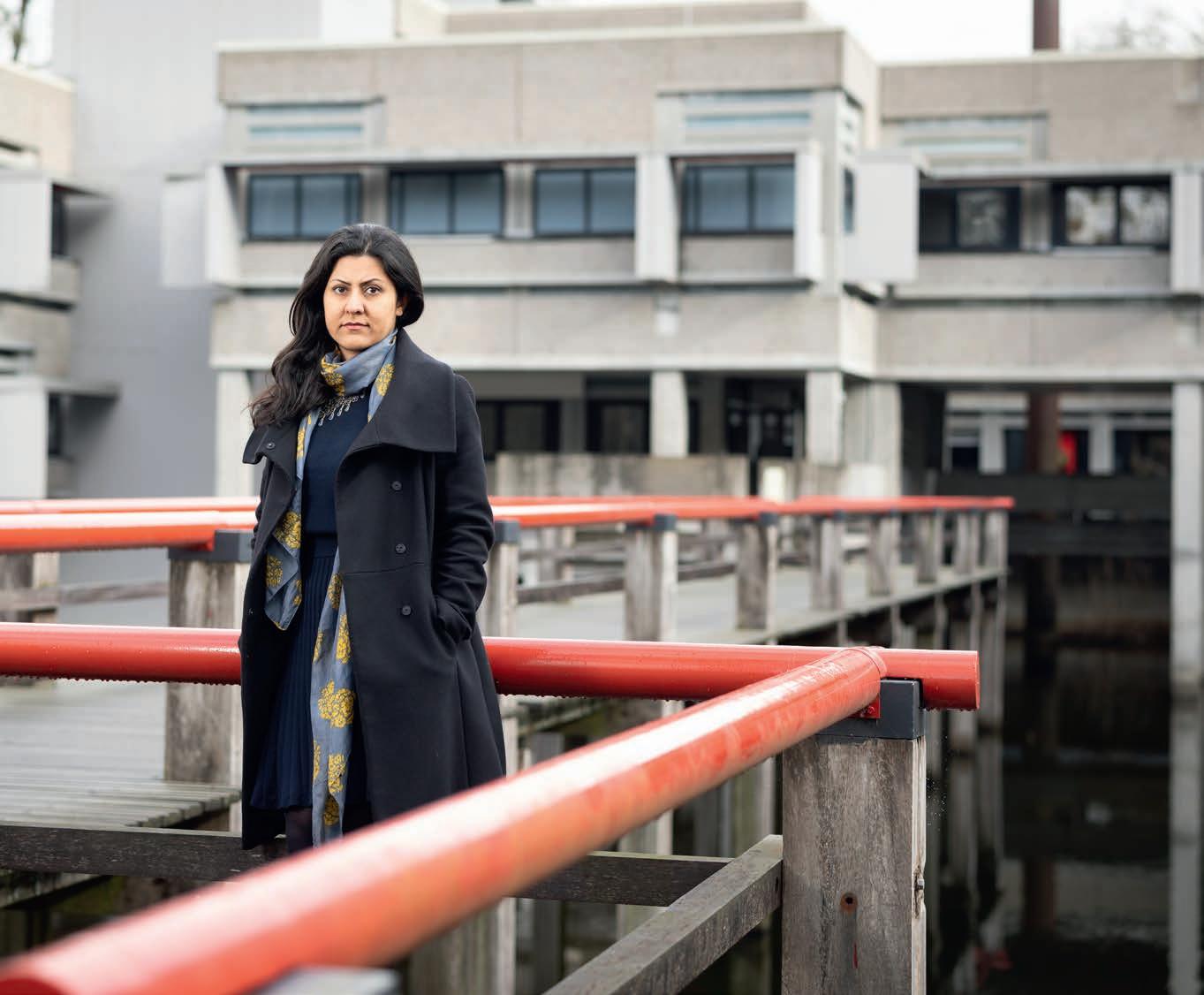
'So, here you are too foreign for home too foreign for here. Never enough for both.'
15 04 • 2023
In the end, I have become my own home.’ •
1992 UT STUDENTS MAKE THE LARGEST COCKTAIL EVER
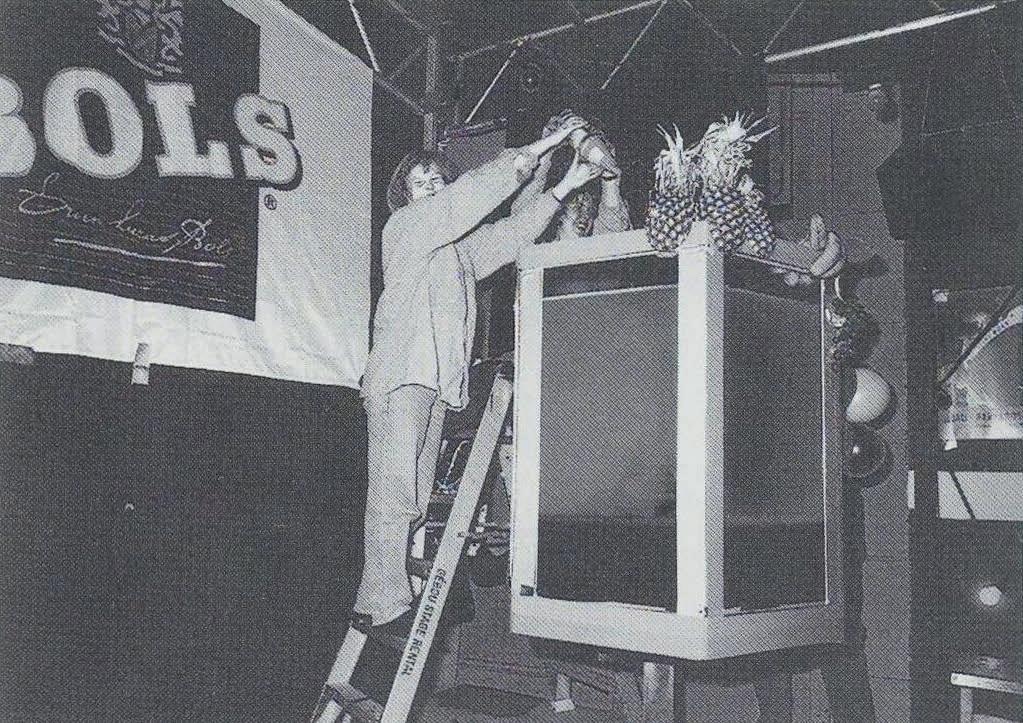
IN ‘BACK TO THE YEAR...’ WE REVIVE BYGONE CAMPUS TIMES WITH REMARKABLE STORIES. IN THIS EPISODE, WE GO BACK TO THE YEAR 1992, WHEN STUDY ASSOCIATION SIRIUS SET A RECORD WITH SEVEN HUNDRED BOTTLES OF BOOZE.
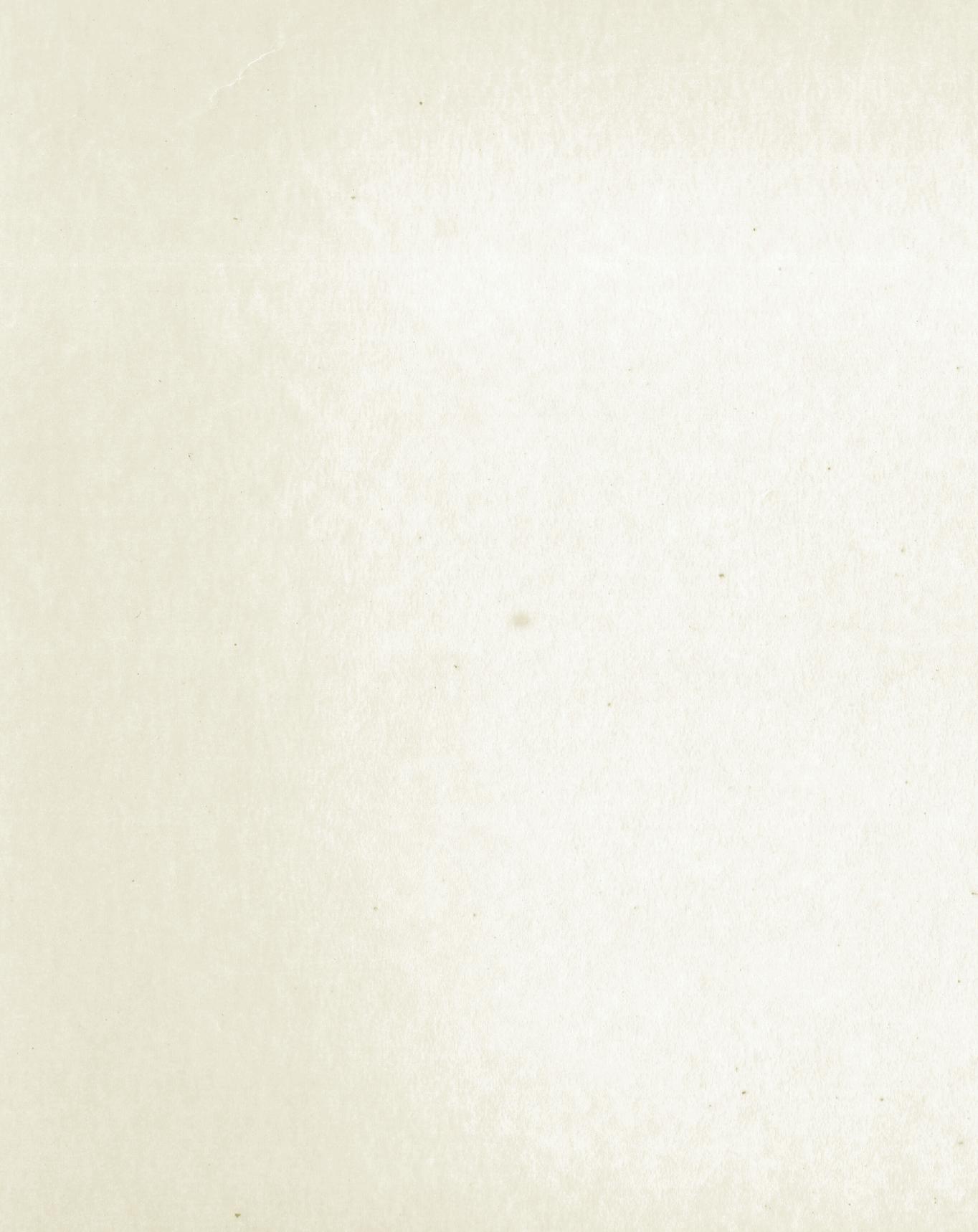
BACK TO THE YEAR Photo: UT Nieuws archive Text: Jelle Posthuma 16 CAMPUS
Students and booze have shared an inseparable bond since time immemorial. In recent years, however, universities have been stepping up their alcohol policy efforts. For example, UT aims to reduce problematic alcohol consumption through information, awareness and normalisation of alcohol-free alternatives. Compare this to 1992, when a group of UT students attempted to create (and drink) the largest cocktail ever made in the Benelux.
BULLETPROOF GLASS AND SEVEN HUNDRED BOTTLES OF BOOZE
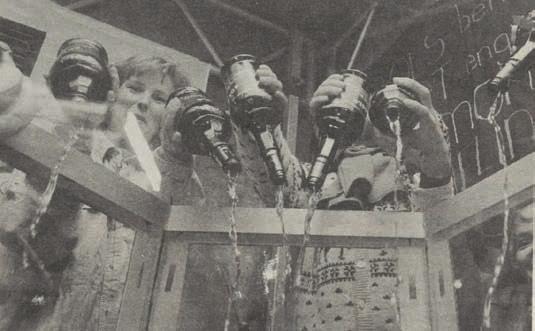
Involved in the action are Annemiek Hamelinck and Simone van der Marck-Verschoor, both UT alumni in public administration. They are looking for a unique stunt for the lustrum of study association Sirius. ‘We were browsing through the Guinness Book of Records and came across the largest cocktail ever made,’ says Hamelinck. ‘We thought it would be a nice record to break. Everything had to fit in a single cocktail glass, that was the biggest challenge. We got an engineering company at UT to build a custom glass just for us. The weight of all the booze put enormous pressure on the glass. In the end, I think they used bulletproof glass and a steel frame.’
Challenge number two: the booze. How does a study association with limited funds find a large amount of free booze? Van der Marck knows just how to solve this problem. She knows a few people at liquor manufacturer Bols and, as chance would have it, the company is just about to launch a new drink, the Red Orange Liqueur. Much to the students’ amazement, Bols decides to donate all the booze needed for a record attempt. Or rather: to sponsor the event. Because the liquor giant considers the students' stunt to be good advertising. The other beverages to be added to the liqueur, Royal Club and orange juice, are also freely acquired via the liquor manufacturer.
RECTOR MAGNIFICUS JOINS IN FOR A DRINK
Now that all the ingredients for the cocktail have been gathered, the students need to find a venue. Hamelinck works at café De Kikker in Enschede and her boss is happy to host the record attempt at his pub. Once they get there, the custom-made glass doesn’t fit through the door. Thankfully, the Sirius students are resourceful: they simply move the record attempt outside, under a special marquee. In the end, it takes the board members one hour and ten minutes to fill the cocktail glass in the right proportions with seven hundred bottles of booze. And it pays off: an employee of Guinness World Records lists the new record.
Also present to join in for a drink are UT Rector Jos de Smit and various Bols bigwigs. Some of the booze is consumed on the evening itself, the rest is bottled, with the proceeds going to the Geert de Leeuw Foundation for the Physically Disabled in Twente. But how did the drink actually taste? ‘It was pretty tasty,’ Hamelinck responds. ‘A bit like a screwdriver.’ But she doesn’t remember much from the evening. ‘I do remember we had fun. We tried our best but didn't manage to finish off all the booze. Unfortunately, we also had to throw some out on the street .’
After a successful evening, the students decide to sell the glass by placing an ad. A few days later, a potential buyer comes forward. The man claims he wants to use the glass as an aquarium. ‘His story didn’t really make sense,’ Hamelinck recalls. ‘But we were just happy he took the glass off our hands. A year later, we read in the Guinness Book of Records that our record had been broken by a few litres. Most likely, the man who bought the glass from us added a few litres of liquor to break the record himself. At least, we’ve always suspected that he did so - we don’t know for sure, of course.’
‘MAYBE WE SHOULD’VE THOUGHT TWICE ABOUT ALL THAT BOOZE’
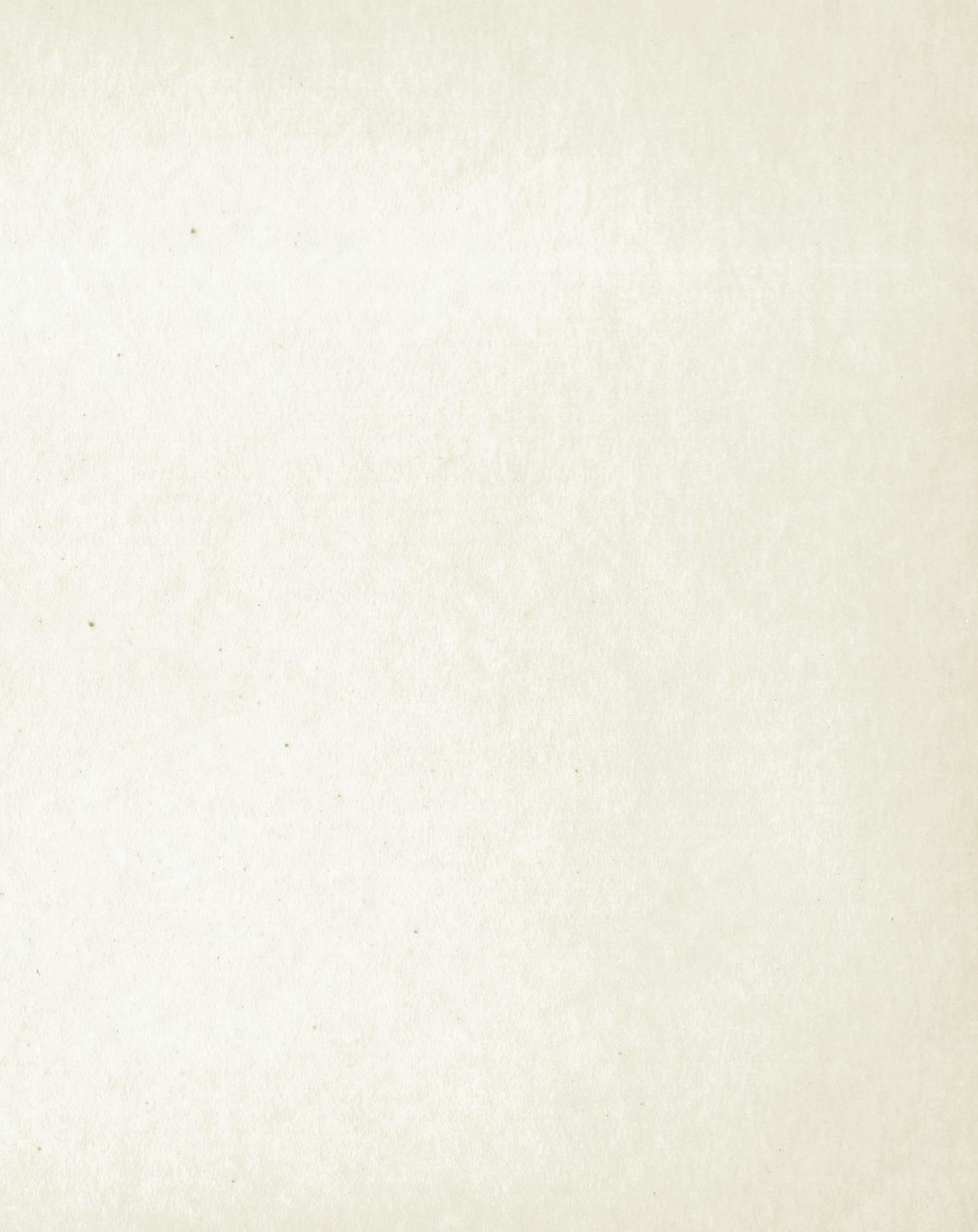
Hamelinck looks back fondly on the typical student stunt. The record attempt even formed an inspiration for her later career. She has been working in communications for years, currently at NIKE in the United States. ‘Our record attempt was basically the ultimate PR stunt. We also made it into several newspapers. Maybe it’s even where my career started. But it’s also simply a great story. When I meet new people and they ask me to tell them about myself, my standard response is: I broke a record once. It works great as an ice-breaker.’
The action is also a fond memory for Van der Marck. ‘Annemiek and I are still close friends. We met during our student days. Your student days really form the basis for future relationships. I wish that for every student.’ Despite the fond memories, she also makes a critical remark about the action. Van der Marck now works for local government and has noticed that the spirit of the times has changed. ‘Nowadays, a special enforcement officer would be sent over of course, but we didn’t even have to arrange a permit. With the benefit of hindsight, I do think that maybe we should’ve thought twice about all that booze. It’s become more of a social issue. Back then, it wasn’t even up for discussion.’
Indeed, a lot of things seem to have changed since then - or maybe not so much after all? Last spring, UT students tried to build the longest beer crate bridge on campus. They probably didn't drink all of the beer themselves but it is not exactly the prime example of a sober campus - even though a few non-alcoholic beer crates were used. But maybe it is just as well. Although the crate bridge turned out not to be stable enough, it is certainly a typical display of student bravado and entrepreneurship, just like Sirius’ cocktail glass. •
17 04 • 2023
INTO THE UNKNOWN
A GOLDEN OPPORTUNITY FOR QUIX QUANTUM
THE ENSCHEDE-BASED COMPANY QUIX QUANTUM IS BUILDING EUROPE’S FIRST PHOTONIC QUANTUM COMPUTER. THE TWENTE CAMPUS IS ESSENTIAL TO THE COMPANY'S SUCCESS, SAYS CO-FOUNDER AND ‘CHIEF SCIENTIST’ JELMER RENEMA.
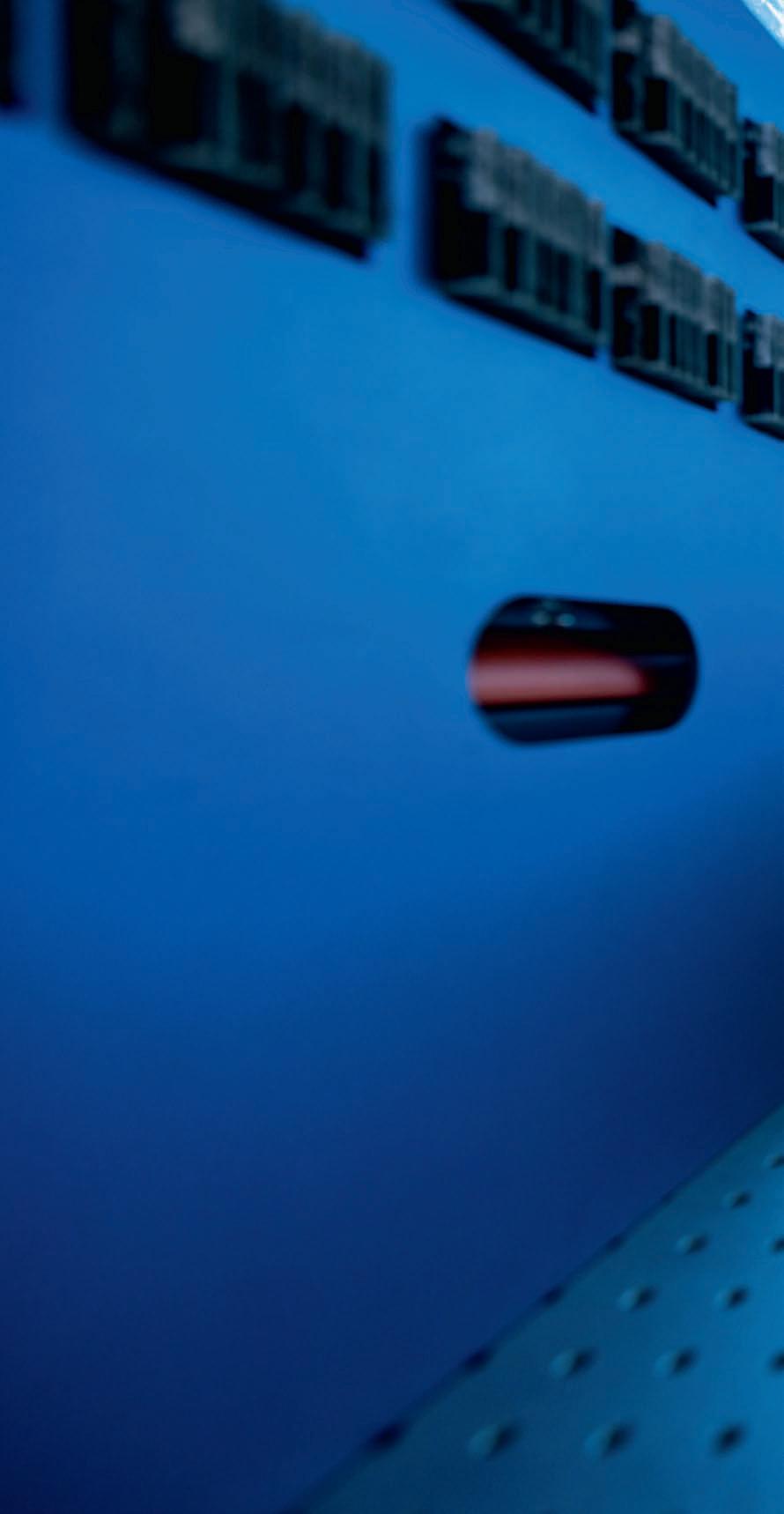
Every start-up needs a goal, a dot on the horizon. For QuiX Quantum, that goal was building the most powerful quantum hardware in the world, based on photonics, i.e. light. ‘And we have now accomplished that,’ says Renema. Indeed, QuiX managed to independently develop a photonic quantum processor. Earlier this year, the start-up was presented with a prestigious Prism Award for this accomplishment, which is like an Oscar for photonics.
But behind every dot on the horizon lies another one, Renema knows. In a start-up, everything is about adjusting, making course corrections, setting new goals. For QuiX Quantum, that next goal is to build a universal photonic quantum computer. And for this new goal, the Enschede-based company is also on the right track: in late 2022, QuiX received an order worth 14 million euros from the German Aerospace Center (DLR) to build such a universal quantum machine based on photonics. The first of its kind in Europe.
APPLICATIONS
Unlike ordinary computers, quantum computers do not just calculate with ones and zeros, but with so-called qubits. This new method of computing allows quantum computers to solve complex problems that are beyond the capabilities of conventional computers. According to Renema, the first applications will be in chemistry. ‘An example would be the production of fertiliser. If we could make this process just one percent
more efficient thanks to precise calculations, it would save millions in factory heating costs. And this is a relative simple chemical reaction.’
After that, we will focus on more complicated biochemical reactions, which are used in the development of medicines, for example, says the assistant professor. ‘That is currently still a trial-anderror process, so rather primitive. With quantum computers, we can accelerate the process significantly by simulating chemical reactions. This would make the development process of medicines a lot cheaper.’ But we are not there yet, Renema stresses. ‘It’s hard to say when the consumer will start to notice the impact of the quantum computers. I expect the true ‘scaling’ of technology will only take place at the end of this decade.’
GOLDEN TIP
QuiX Quantum wants to play a decisive role in this development. With its first mega-order underway, the Enschede-based company is heading in the right direction. Its journey started in Oxford, where Renema worked as a junior research fellow in 2017. ‘I was conducting research with photonic chips, or at least, that was my plan. There was one problem: we had a shortage of such chips. We were having a meeting about this when a new postdoc happened to drop by. He was from the University of Twente. “I know where you can get those chips”, he told us during the meeting.’
The postdoc refers Renema to Twente. As it turns out, this was a golden tip. Twente is a frontrunner in the field of photonics and Renema is given a chip that allows him to take measurements in Oxford. ‘While doing these measurements, we found out that these chips are also very well suited for quantum applications.’ After his research, Renema decides to pursue the subject of photonics chips ‘upstream’, all the way to Twente. ‘I didn’t have any connections at UT; I'd obtained my PhD in Leiden, but now I knew where the photonics chips came from. That’s why I decided to take a leap in the dark and go to Enschede.’
PHOTONICS CLUSTER
Once he is settled in Twente, where he starts working as an assistant professor, he gives a presentation at LioniX, the Enschede-
18 CAMPUS
Photo: Rikkert Harink Text: Jelle Posthuma
based company that produces the photonics chips. ‘I did so based on the notion that if you borrow something, you should also explain what you used it for. No other reason. However, after I finished my presentation, the conclusion was: we should start a company.’ And so they did. In 2019, Renema founded QuiX Quantum together with LioniX CEO Hans van den Vlekkert. ‘We saw the potential of the technology and knew we had to explore this. A golden opportunity was staring us in the face.’
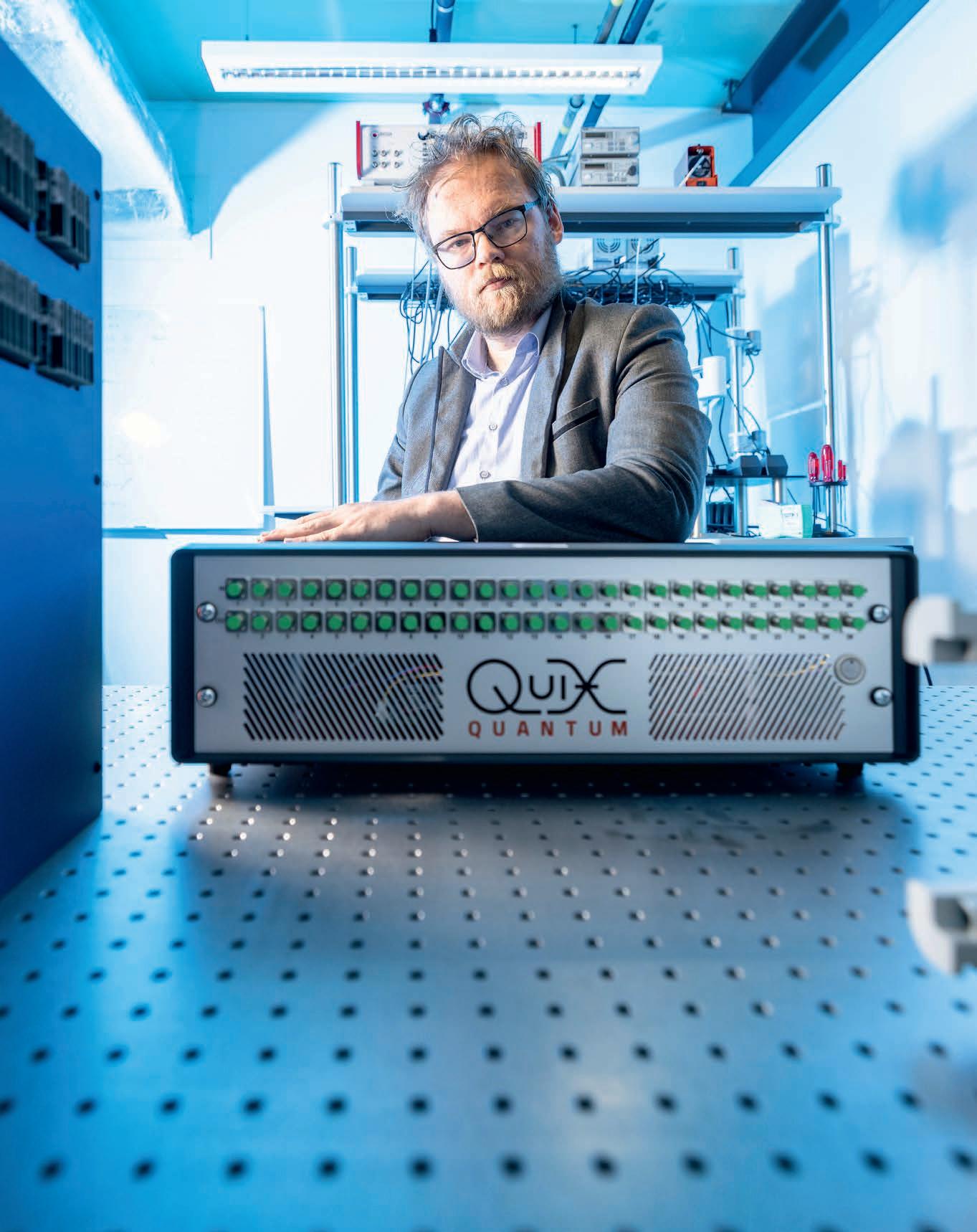
Several technologies are in the running worldwide for the construction of quantum computers. According to Renema, the use of light, aka photonics, has major advantages. First of all, the technology is very scalable. Furthermore, Twente has a strong photonics cluster. ‘Twente is very good at classical photonics, both on the business side and at UT. We were given a box of Lego bricks, as it were, and all we had to do was click them together to build our quantum hardware.’
KNOW-HOW
The region also has a ‘powerful’ ecosystem for start-ups, Renema knows. ‘Start-ups are well facilitated from within the university. It’s very helpful when people tell you: this is our experience from the past few years, and we see that things often go wrong in this area. There is a lot of know-how. That’s truly something special and we have to safeguard it.’ Moreover, the university and start-up companies like QuiX Quantum are mutually complementary. ‘We were able to build our processor thanks to the measuring equipment at the university. At the same time, UT can use our processor for education and research.’
According to Renema, there is just one area for improvement: doing away with the typical Twente diffidence. ‘When I tell people that we build the best hardware for quantum photonics here in Twente and that we successfully commercialise it, they’re often surprised. That’s why we have to get this message across even more effectively.’ •
19 04 • 2023
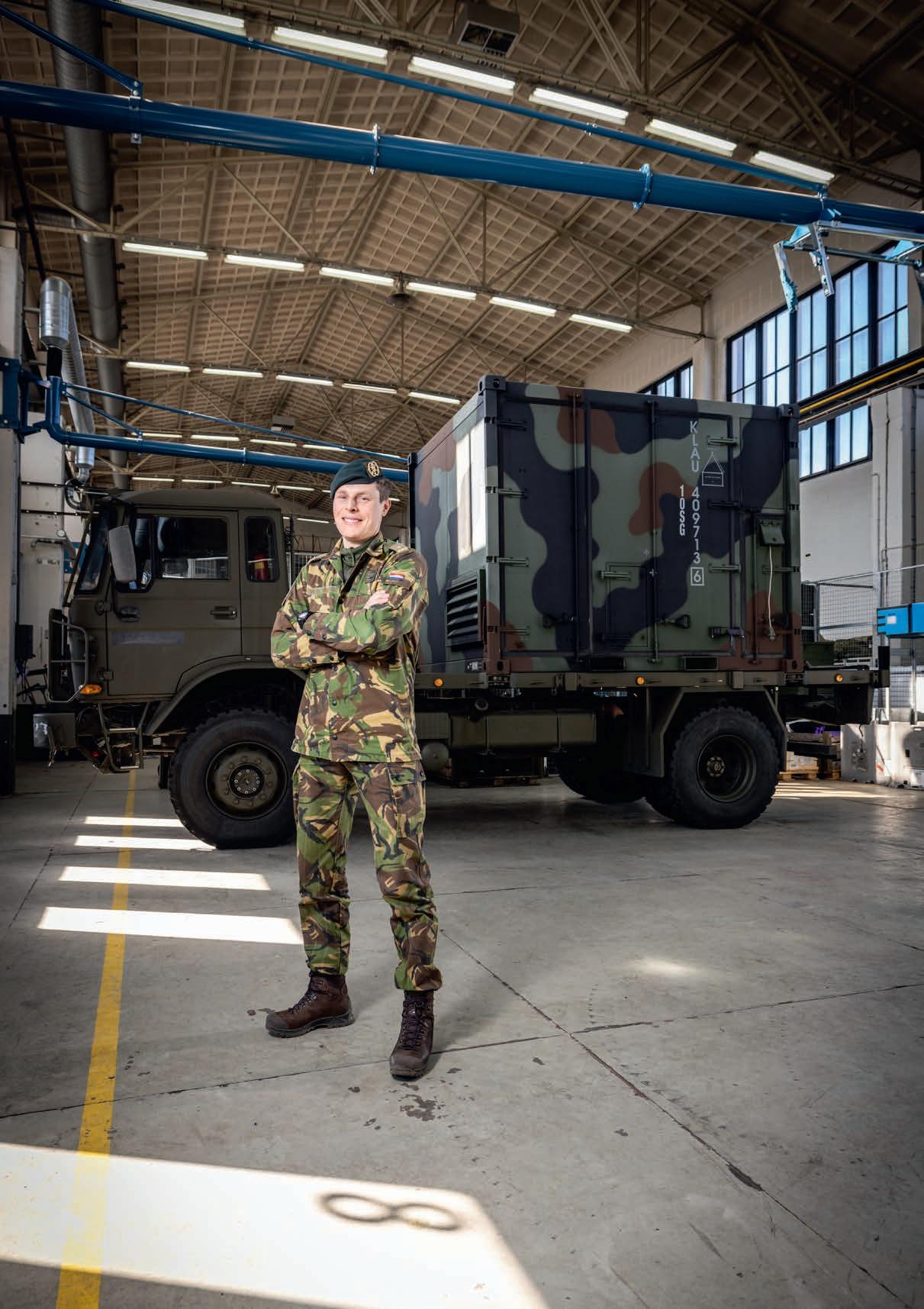
INTERVIEW
Photos: Rikkert Harink
20 CAMPUS
Text: Stan Waning
UT ALUMNUS BEREND BEKKER
‘MANPOWER WILL ALWAYS BE NEEDED, THAT IS WHERE OUR STRENGTH LIES’
THE PATH TO HIS CURRENT POSITION IN THE ARMY HAD ALREADY BEEN MAPPED OUT IN 2006. AFTER FOUR YEARS OF STUDYING CIVIL ENGINEERING AT THE UT
AND A FEW CAREER STEPS WITHIN THE DEFENCE ORGANISATION, STUDENT
BEREND BEKKER WAS TRANSFORMED INTO COMMANDER BEKKER (36). ‘THE UT HAS MADE ME STRONGER IN EVERYTHING I DO NOW.’
When you turn onto the long driveway to the Prinses Margrietkazerne in Wezep, you need no reminding that behind the barriers lies military ground. Along the side of the road, there are signs displaying core values such as courage, dedication and resilience, as well as a warning to visitors to stay on the road at all times: ‘Danger: firing range ahead.’
In a building not far behind those barriers, Commander Bekker keeps office. ‘Although I try to be here as little as possible. It’s often unavoidable, but I prefer to be among my people.’ He is referring to the 100 or so men and women he has serving under him in the defence hierarchy as commander of the MREC (Multi Role Engineer Company) unit.
ENGINEERS
To put that unit into perspective: The MREC unit comprises four specialisms that fall under the Army. These include the infantry, which is the combat unit, but also the artillery; they fire bombs over longer
distances. In addition, there is the medical service and a technical service. Here in Wezep, you’ll mostly find engineers. ‘The Engineers branch specialises in combat support, construction and hazardous materials. That’s primarily the focus of our unit.’
Bekker’s office is located in a tall warehouse containing numerous military vehicles that are part of his unit’s equipment. The Multi Role Engineer Company has five platoons. A CBRN decontamination platoon, CBRN reconnaissance platoon, the Advanced Search platoon, the Armoured Engineers reconnaissance platoon and the logistics platoon. CBRN stands for Chemical, Biological, Radiological and Nuclear. ‘Those teams are on standby in case of a chemical incident or if the enemy has deployed a chemical weapon. The Armoured Engineers reconnaissance team conducts terrain reconnaissance - as inconspicuously as possible. For example, they check whether bridges are sturdy enough to cross in a tank, and they scout obstacles or minefields. The Advanced Search
21 04 • 2023
platoon specialises in detecting prohibited substances. They can discover hidden spaces in buildings where money, USB sticks or weapons are stored and they support civilian authorities in search operations.’
SIMULATING CONFLICT
Bekker’s days at the barracks start promptly at 7:50 am with a roll call. Every morning, he stands in front of the unit, checks who is late or absent due to illness, and gives a briefing on current affairs. ‘If something went wrong during a drill, I address the group in a disciplinary way, but I also give gratifications when the work was executed well. After that, we exercise for an hour and then we start the day. For me, that’s mostly management work, such as meetings about the long term. In addition to the barracks weeks, we conduct drills. Both inside and outside the country, where we simulate conflict situations.’
During those drills, Bekker is in command and bears the overall responsibility. Is such a drill anything like what you see on television programme Kamp van Koningsbrugge? ‘Not really. There, it’s about training and forming special operations units for the Commando Corps. We focus on training procedures. Everyone has already been trained, so I don’t have to root out the rotten apples.’
In the past, Bekker - working in a different position at the time - was sent on missions to Afghanistan and Mali. There, his unit searched for roadside bombs and inspected roads for safety. More recently, MREC helped with testing and vaccination during the COVID-19 pandemic. His unit also set up a tent camp in no time for asylum seekers who were unable to get shelter in Ter Apel. ‘You can automate to a certain extent, but manpower will always be needed. That is precisely where our strength lies. We can quickly be called in and deployed to help where needed. Our people are our greatest asset.’
The commander’s days are very different from his student days in Enschede, although there are some parallels too. The barracks, bordering the Veluwe National Park, are somewhat reminiscent of a campus, with its sports facilities, forests and residential complexes. Back when the campus in Enschede was still his home, he already knew where he would end up. ‘I didn’t choose to study in Enschede. My current position was the goal, even then. Together with eleven others, we completed the military training in Breda and then entered the Civil Engineering programme in Enschede.’
SALARY
Bekker thinks his student days were similar to those of an average student, although it was obvious to everyone who was a regular student and who was a military student. The “defence team” had to complete the programme without delay and already received salary from the Defence organisation. ‘It felt like work to us. We were always in the front row during classes, had our notebooks and the like in order and were always on time. Our experience was very different from that of fellow students.’
Despite that difference, Bekker still thinks of the time from 2006 to 2010 as study years. Not only did he live on campus, he was also involved in tennis association Ludica and was one of the founding members of survival run association Tartaros. On Thursday nights, he would often go out; there was room for that. ‘I appreciated the Twente sobriety. I also liked the relaxed atmosphere on campus and the UT has made me stronger in everything I do now: through substantive knowledge and the academic working and thinking level. For that, I’m grateful to the UT.’
Bekker chose to work in Defence when he was younger because he was drawn to adventure. ‘As time went on, I found out that the work gives me satisfaction. I have friends who work in an office and their job is to make the director richer. There’s nothing wrong with that and I have no doubt that work is important, but I don’t feel that need at all. I want to help other people as best I can. This is clearly reflected in the sense of togetherness felt here. We depend on each other and the bond between us is vital.’
Doing the right thing for someone else. That motivation is why Bekker advises today’s students to choose a career in Defence. ‘Without a doubt. We all have to work for quite a long time. So first choose something that challenges you. The opportunities here are endless. You can always change your mind and choose a regular job.’
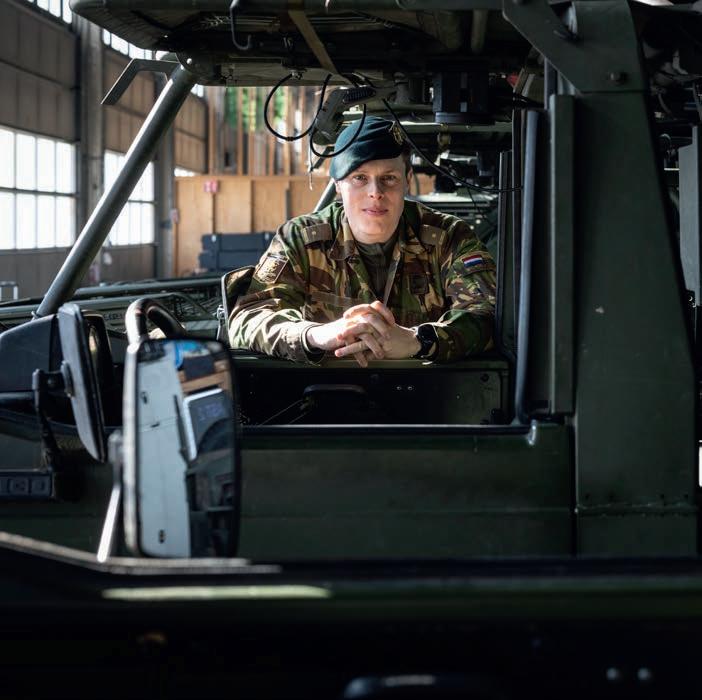
If you bring up the topic of Defence nowadays, people quickly make the link with the war in Ukraine. And after years of budget cuts, it is now also receiving a lot of political attention. Those discussions are far beyond Bekker’s reach, but he appreciates that The Hague is making more budget available. Like many citizens, he follows the war with great concern. He doesn’t want to think too much in terms of scenarios, but what if the war escalates and his help is needed? ‘Then I’ll be there, because that’s the choice I made. That can be difficult in my private life, but it's my duty. We also discuss this within the unit. I respect colleagues who don’t want to be deployed, but the consequence is simple: that person will have to hand in their uniform. It means they’re not suited for the job.’
As long as Bekker feels that his work makes a difference for others, he will keep doing it. ‘That means I’m satisfied. The question “why” is extremely important to me. If someone demands something of me without explaining clearly why we’re doing it, I keep looking for the reason why. As long as I can make a difference for others through my work, I’ll keep doing it.’ •
22 CAMPUS
‘I HOPE THE UT COMMUNITY WILL VISIT LANGEZIJDS AS MUCH AS POSSIBLE ’
Freek van der Meer has been Dean of ITC for about three years. In April, the faculty moved from Hengelosestraat to Langezijds. We ask him five questions about the move to campus.
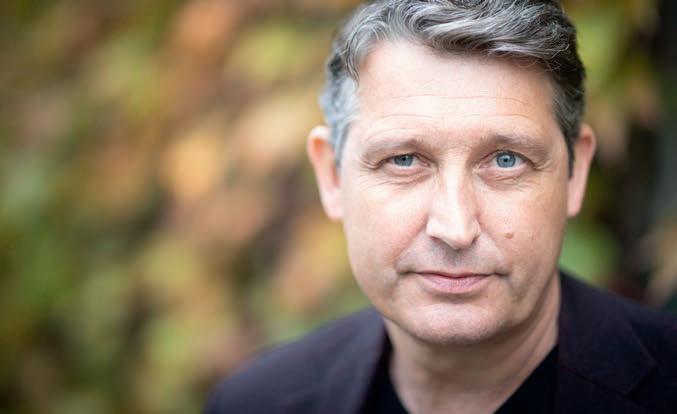
WILL THE FACULTY MISS THE BUILDING ON HENGELOSESTRAAT?
HOW WERE THE LAST FEW MONTHS WITH THE MOVE ON THE HORIZON?
‘These last few months, there was a 3D projection in the hall of the building on Hengelosestraat, counting down the number of days. You could feel a kind of shock wave going through the building, because people were realising that the move was really happening. I’d describe the atmosphere as organised chaos. There was a lot of tidying up to do. All over the building there were containers and tables full of stuff. I also found out that we had quite a lot of art, in storage as well. Sometimes it felt almost like the TV programme Antiques Roadshow. We’re still figuring out what to do with all the art.’
‘That differs from person to person. I was there for a couple of years but never really missed the building I'd worked in before that. Still, it was a nice place for us as a faculty. Some staff members had worked there for 25 years and never moved to another building. Maybe they will miss it. The building always felt like home, but on the other hand: Langezijds offers us so many advantages that I expect we’ll soon settle in here.’
WHAT WERE THE BIGGEST CHALLENGES DURING THE MOVE?
‘Moving staff and students was not a problem. We wanted to minimise the impact on teaching so that meant one week of online classes and students could work on assignments. There were also exams in the old building but we scheduled those in such a way that students were not affected. Moving the labs was more challenging. Especially the chemistry lab, which contains a lot of sensitive equipment. That's always a bit stressful. This is why we went about it in a professional manner, but in practice, it always proves to be a challenge. It’s like installing a new kitchen at home. There’s always a missing socket somewhere.’
THIS MOVE INVOLVES A CONSIDERABLE LOSS OF SPACE. HOW WILL YOU ACCOMMODATE THAT?
‘There’s a reason why everyone was only allowed to bring two moving boxes, but I don't expect any major problems. Everyone has their own workplace in this building as well, and there are several call and meeting rooms. It’s up to the departments to decide the layout. Especially with the increase in hybrid working, I expect we’ll all be able to find our place.’
WHAT DOES THE COMING PERIOD LOOK LIKE?
‘We want to organise something for the Open House on Saturday 3 June, and an official opening will take place after the summer holidays. I really hope the UT community will come to see the building as often as possible. In the past, if you wanted to go to ITC, it was really like a visit, often by appointment even. Here, you can just walk right in. And I hope everyone will do so as much as possible, including students. Let’s hope for a lot of intermingling.’ •
01
02 03 04 05
Photo: Rikkert Harink Text: Stan Waning
FIVE QUESTIONS
23 04 • 2023
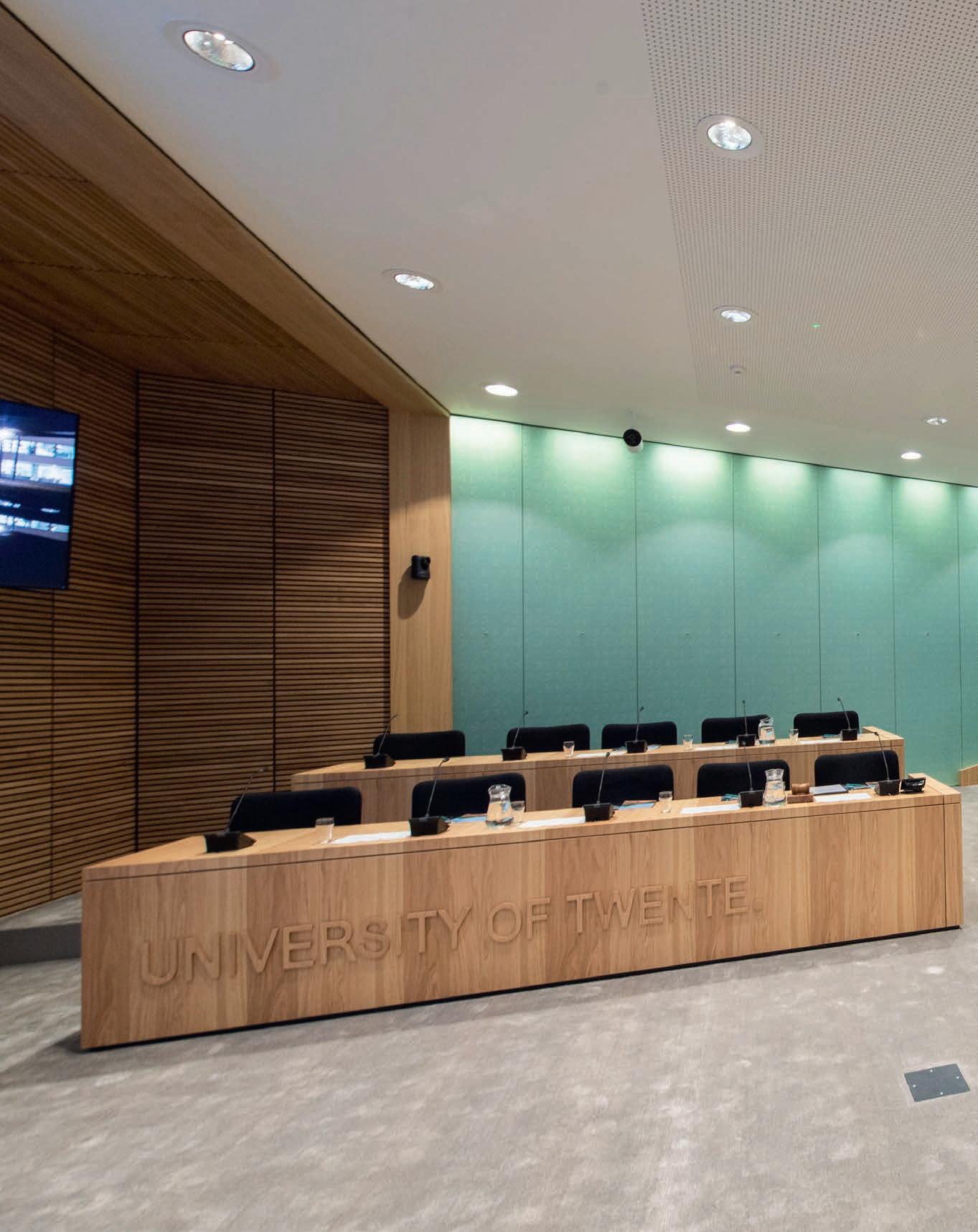
IN THE PICTURE
Photo: Frans Nikkels
Text: Jelle Posthuma
CAMPUS
HORA EST!
What is the most important moment in your life? For many people that might be the birth of a child, buying a house or perhaps their wedding. Scientists can add another occasion to this list: defending their doctoral thesis during a PhD defence, as a reward after at least four years of toil. Everyone should be able to attend such a unique moment. There should not be only the PhD candidate and professors, but also family, friends and colleagues in the room. That is why, at the beginning of this year, dean Jennifer Herek opened a special lecture and defence room accessible for disabled people at the UT. So that really everyone –after first watching the PhD candidate sweat through their shirt for an hour - can enjoy the beadle's redeeming words: Hora est! •
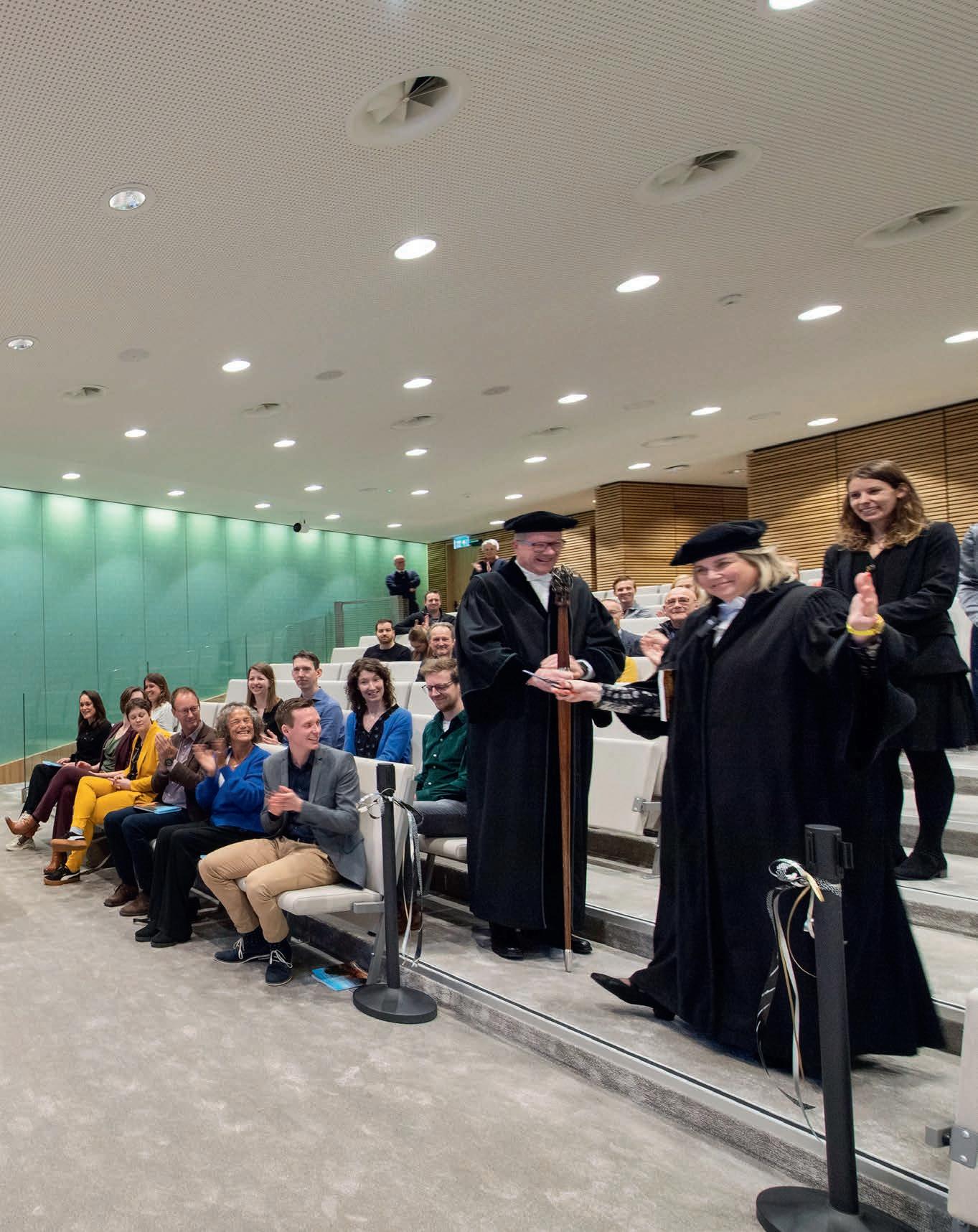
25 04 • 2023
MAKING AN UNTREATABLE DISEASE TREATABLE
FINDING A TREATMENT FOR A DISEASE FOR WHICH THERE IS ZERO CHANCE OF SURVIVAL. THAT IS THE MISSION UPON WHICH UT SCIENTISTS LOES SEGERINK, ANDRIES VAN DER MEER AND KERENSA BROERSEN HAVE EMBARKED, TOGETHER WITH PAEDIATRIC ONCOLOGIST DANNIS VAN VUURDEN AND THE TOBIAS SYBESMA FOUNDATION. THEY WANT TO USE ORGAN-ON-A-CHIP TECHNOLOGY TO TRY TO PREVENT THE INEVITABLE FOR BRAINSTEM GLIOMA PATIENTS.
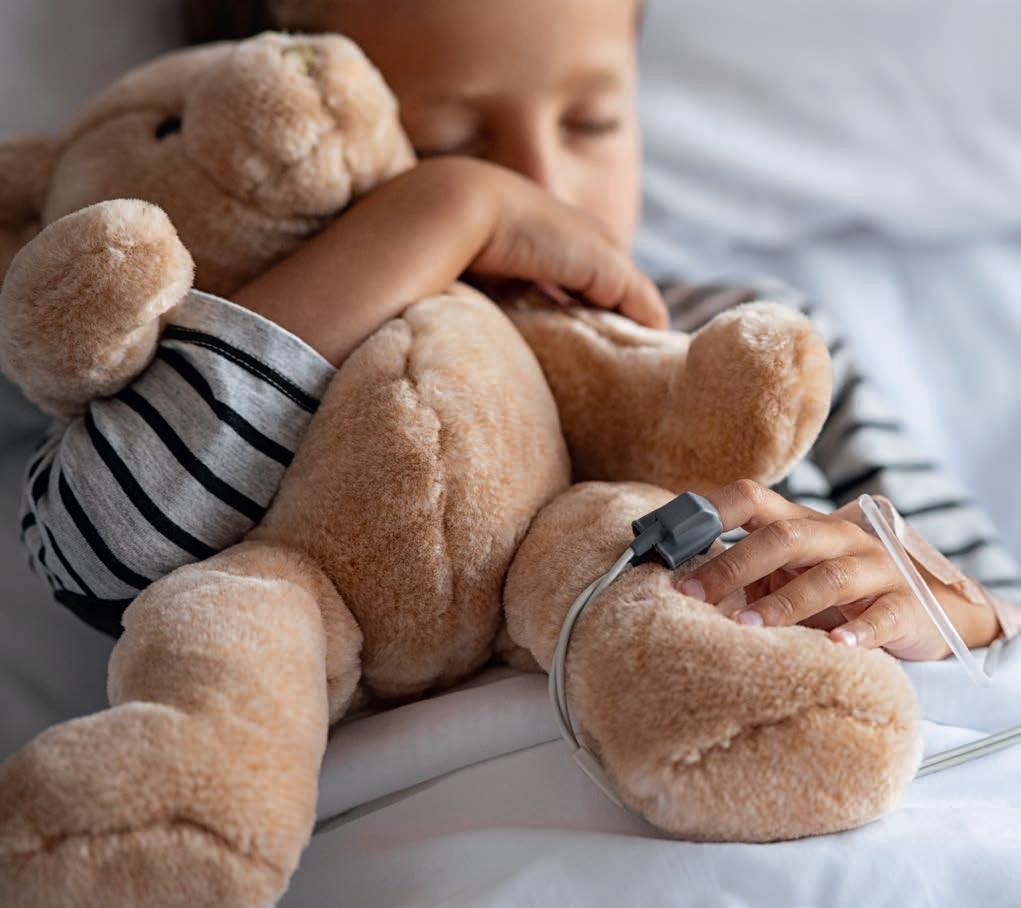
RESEARCH 26 CAMPUS
Tobias was fine when I left, but in a bad state when I got back.’ It is the autumn holidays of 2017: father Reitse is in southern France and son Tobias and daughter Novalinde are on holiday with their grandparents, as is tradition for the family. During the video call, Reitse already notices that something is not right. Tobias also mentions it himself. His motor skills falter, he even drools a little. Reitse races back at full throttle, to the hospital in Zwolle. His wife Evelien doesn’t have to say anything for him to know that things are not right. The diagnosis: a tumour on the brainstem, a diffuse intrinsic pontine glioma - or DIPGthe term used by medics. The chance of being cured: Zero percent.
THE INEVITABLE
DIPG is a rare form of brain cancer. On average, ten children and ten adults in the Netherlands are diagnosed with the disease every year. In 2017, Tobias Sybesma was one of them. Not long after, the Sybesma family came into contact with paediatric oncologist Dannis van Vuurden, who was working at the VUmc at the time and offered Tobias a spot in a treatment trial. ‘With DIPG, the tumour is located in the so-called pons, the bridge between the brain and the spinal cord that controls the heartbeat, breathing and swallowing functions, among others,’ he explains. ‘The tumour is diffuse and therefore it’s so intertwined with the brainstem that it is completely inoperable. The only thing we can do is medicate - through radiation. That can temporarily halt the growth of the tumour cells until eventually, the inevitable happens.’
As the treatment was initially unsuccessful, the Sybesma family feared Tobias would not live to see his 12th birthday. Father Reitse started counting ‘bonus days’ from that point on. Until the inevitable eventually did come to pass. After 248 bonus days, Tobias Sybesma died on 31 July 2018. Two days after his death, father Reitse started the Tobias Sybesma Foundation. The dream: to find a treatment for brainstem glioma. Since Tobias wanted to become a professional volleyball player, a
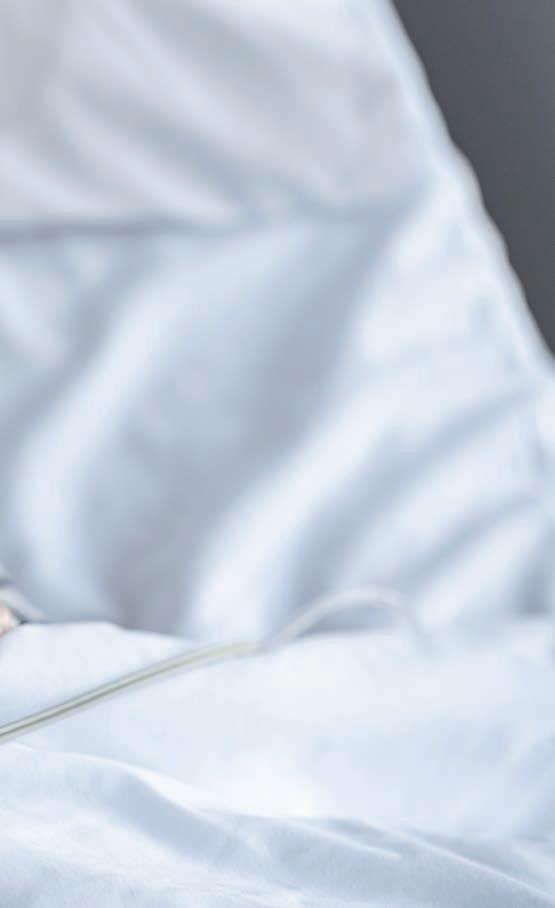
benefit match was organised. The Twente '05 coach directed Sybesma to UT professor Albert van den Berg, who might be able to help. The latter in turn reached out to Loes Segerink, who called in the expertise of colleagues Andries van der Meer and Kerensa Broersen.
ORANGE FLOORS AND A BARRIER
And so, a special triangular collaboration was formed in November 2019: the father who lost his son to the disease, paediatric oncologist Van Vuurden who is on duty at the hospital every day and the three Twente scientists. Their common goal ever since: to try to make that untreatable disease treatable. They explain how arduous the path to that goal is at the Princess Máxima Centre in Utrecht, Europe’s largest paediatric oncology centre and the place where Van Vuurden has been working for several years now. A bright place with bright orange floors, full of teddy bears and colouring pages. And a place where laughter and tears are never far apart.
‘The difficulty lies not only in how intertwined and diffuse the tumour is in relation to the brainstem,’ Broersen explains the complexity of the disease. ‘What makes it extra difficult is that people’s immune systems don’t respond to this variant. That does happen with other types of cancer; it’s like having a splinter in your finger, where the surrounding tissue becomes inflamed. However, the immune system doesn’t react to these tumour cells. We don’t really understand why yet.’ And then there is the blood-brain barrier, Van der Meer continues. ‘The blood vessels in the brain are unique and there is a literal barrier between the vessels in the brain and the other blood vessels in your body. What the barrier does, basically, is prevent bad substances from reaching your brain; but likewise, they also prevent substances from pills or infusions from entering your brain.’
‘
Photos: Shutterstock & Christiaan Krouwels Text: Rense Kuipers
27 04 • 2023
‘ The only thing we can do is medicate ’
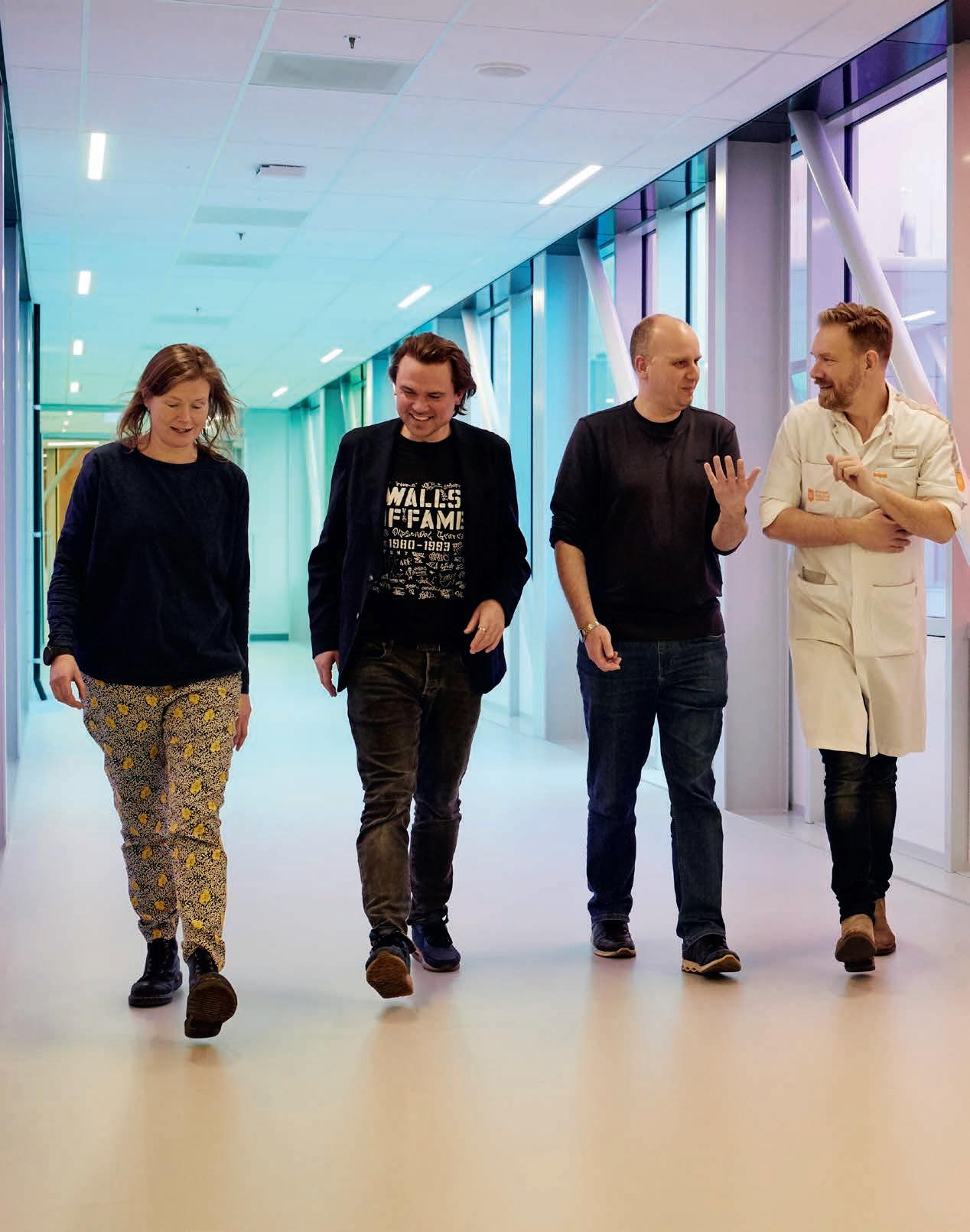
28 RESEARCH
CAMPUS
FROM LEFT TO RIGHT Kerensa Broersen, Reitse Sybesma, Andries van der Meer, Dannis van Vuurden. Loes Segerink is not in the picture.
PATIENT ON A CHIP
The UT researchers use organ-on-a-chip technology to find a possible solution. ‘The previous method involved a plate with holes in it, containing tumour cells. By adding a certain concentration of a medicine, you’d then be able to see whether the tumour cells would die,’ Broersen explains. The organs-on-chips method is very different. ‘The brain is so much more dynamic than a plate with holes in it. We can mimic this brain function much more accurately in a microfluidic environment. That way, we can use stem cells to build mini-brains and mini-tumours, which allow us to replicate the actual situation as closely as possible. And we can obtain those stem cells from patients’ urine, so it’s completely non-invasive.’ Van Vuurden is very much in favour of this approach. ‘The old method, the plate with holes, has its merits. But I also thought: there has to be a better way. There was too big a gap between the test setup and the patient lying in bed a few doors down. The organs-on-chips allow us to approximate the actual situation much better; a medicine shouldn’t just be effective against the tumour, it also has to leave the surrounding healthy cells unaffected: the so-called therapeutic index. The fact that we now have a “patient on a chip”, as it were, is extremely helpful in this process.’
The researchers received help from PhD candidate Job Komen. ‘He developed so-called pharmacokinetic models, in order to simulate in the chips how different types of medication can get past the blood-brain barrier and kill a tumour cell,’ Van der Meer explains. The first results were promising. ‘Even the extremely low concentrations of medicine that can enter the human brain sometimes proved enough to kill certain DIPG tumour cells in the chips. That observation has given us confidence in the potential efficacy of such a substance when used in patients.’ Building on this initial success, the researchers now aim to further develop the technology: ‘That’s another advantage of this methodology with microfluidic chips: it allows you to dramatically scale up your testing capacity. So just like that, we can test a thousand different treatments.’
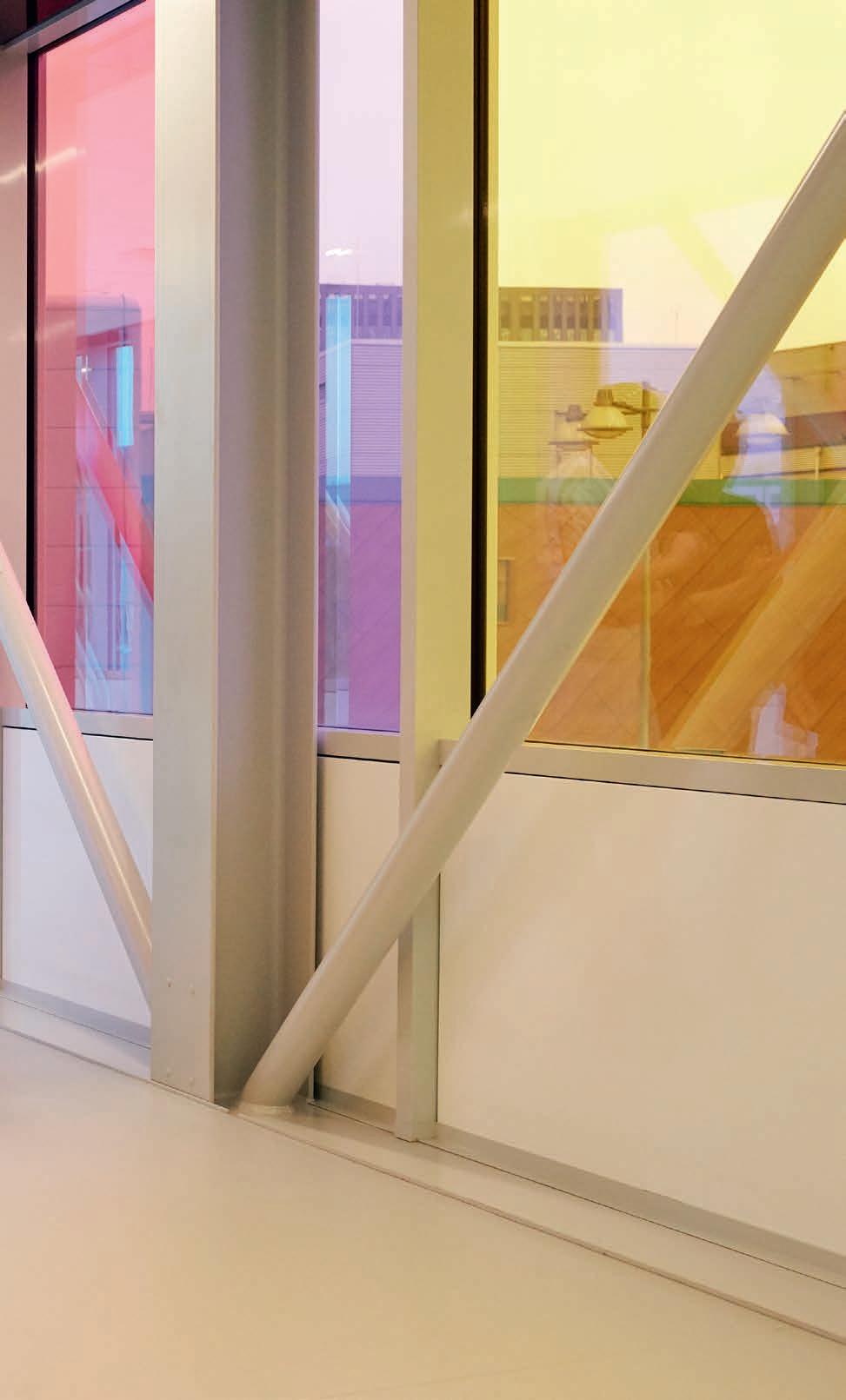
CONSTANT CONFRONTATION
The PhD candidate’s work was given a new impulse recently; Segerink and Van Vuurden received a grant from the Dutch Cancer Society, KWF. ‘To try to cross the blood-brain barrier during radiation treatment using ultrasound,’ Segerink explains. ‘We’re also getting help from UT spin-off Demcon in order to achieve this. It all started with Reitse knocking on our door and resulted in a research project that will continue for at least the next four years.’
It is an unusual collaboration, especially when compared to how most scientific consortia are formed. And that is precisely where its strength lies, say the people involved. ‘Much of the credit should be given to Reitse, he is the driving force behind the partnership,’ Broersen points out. ‘Moreover, the essence of being a scientist is that you have the freedom to pursue a certain curiosity,’ says Van der Meer. ‘Through the strong involvement of a parent, we are constantly confronted with the reason why we’re doing this,’ adds Van Vuurden. ‘It’s something I notice here in this hospital as well: the purpose of helping sick children to get better. This is felt by everyone, from porters to professors. Everyone involved in this project also just wants to help; they’re not here out of selfishness or to get published in Nature.’
HOPE
Even though a spark has been ignited that won’t be snuffed out any time soon, the path to a possible treatment method is still just as long as it is complicated, they say. ‘I can’t be saved any more, but I hope I’m the last one.’ This is a quote by Tobias that is prominently displayed on the foundation’s website. ‘Of course, everyone understands that that was not the case,’ says Sybesma with a grimace. ‘But we have to start somewhere. Ideally, someone would have the guts to invest big money, so we don’t have to depend on the subsidy system,’ Segerink adds. ‘Finding a treatment should be feasible,’ says Van Vuurden. ‘Mankind has always been able to solve problems through innovation and technology. So why wouldn’t that apply to brainstem glioma?’
Other than money, this goal requires energy, knowledge and a critical mass of experts willing to do their part to find a solution. Hope instead of a death sentence in disguise. ‘Tobias also had his thoughts on that. About how we could make a game in which everyone would work together to puzzle out a cure.’ And there is always hope, Van Vuurden stresses. ‘I always believe there is hope, every time I have to bring bad news. I never say: this is the situation and you’re going to die. You never know what tomorrow will bring.’ Sybesma recognises that. ‘We lived from day to day, minute to minute. There were plenty of moments after the diagnosis when we were intensely happy. It was in the little moments, for instance when the cat crawled under his blanket. And ten minutes later, we would be calling the emergency number. We were masters at living in the moment. And we never gave up hope.’ •
29 04 • 2023
‘KING CHARLES WAS VERY INTERESTED IN MY WORK’
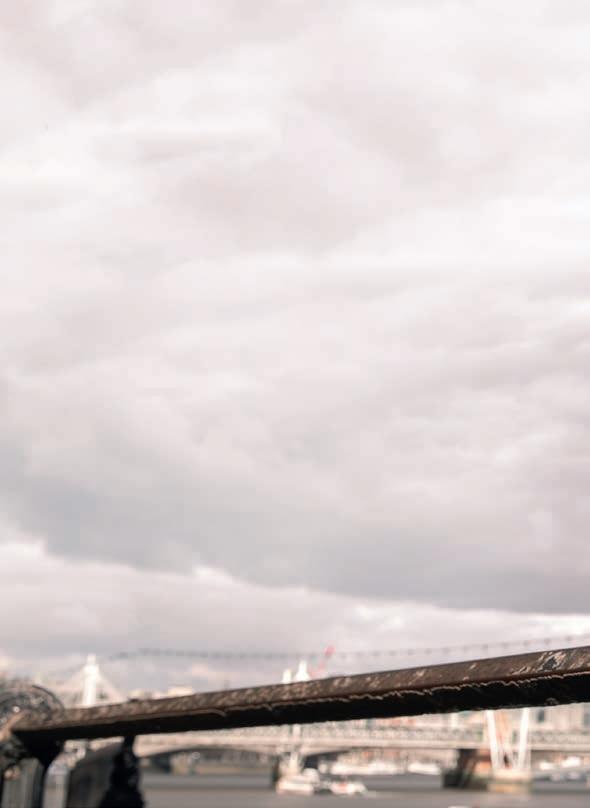
STUDENTS OR RESEARCHERS? PHD CANDIDATES FALL INTO A CATEGORY OF THEIR OWN. IN THIS SERIES, WE PUT YOUNG ACADEMICS OF THE UNIVERSITY OF TWENTE IN THE SPOTLIGHT. THIS EPISODE GIVES THE STAGE TO CATALINA JAIME SANCHEZ, WHO BALANCES BEING HEAD OF CLIMATE AND CONFLICT AT RED CROSS, A DEDICATED HUMANITARIAN, MOTHER OF TWO AND PHD RESEARCHER AT ITC FACULTY.
WHO I AM
‘I’ve always been a humanitarian. It has always been a part of me. I was already involved in the Colombian Red Cross as a child. I grew up in a neighbourhood close to irregular settlements in the mountains, and I’d go there on Saturdays to do social work with the local community. We’d organise vaccination campaigns, teach people to read, work with kids and so on.
Now I work as the Head of Climate and Conflict at Red Cross Climate Centre in London. In my role, I’m focused on bringing climate action for people who are affected by conflict. We provide the necessary knowledge and support to organisations that work on the ground. We invest a lot of efforts in advancing anticipatory action, meaning early warning systems. Early warning and early action have been a big part of my career. I have always highlighted the need to set up systems that provide better forecasts, early action and allow us to prevent and reduce risks.
Thanks to my role, I was even invited for a visit in Buckingham Palace last year. King Charles was interested in humanitarian implications of climate change, specifically in the effects of the disastrous floods in Pakistan, and I was able to give him a presentation on these topics. He was very interested and asked a lot of questions. It was a great experience.’
MY PHD RESEARCH
‘I come from a very humble Colombian family, but my family has been fascinated by education. My mom had me when she was very young and my parents invested a lot in making sure that we had good education. My cousins and I, we were all able to get a university degree and now we are getting our PhDs. That is just incredible. We are the first generation Masters and PhDs in our family!
And I’ve always wanted to do a PhD! That has been one of my big dreams. I got my Bachelor’s degree in Colombia and was lucky to get
PHD STORIES
30 CAMPUS
Photo: David Woolfall Photography Text: Michaela Nesvarova
a scholarship, which allowed me to get a Master’s degree in Europe. I wanted to continue studying, but I also had to make money and so I started working. I worked on many different humanitarian projects for many years. While I was working in Haiti, I first got in contact with the Climate Centre and met Maarten van Aalst [professor at ITC, e.d.]. I thought the work they were doing was amazing. A few years later, the stars aligned and I got a job with the Climate Centre. Some years later, Maarten got his professorship at ITC and he knew that I was interested in doing a PhD. The stars aligned again and I was able to start my doctoral research.
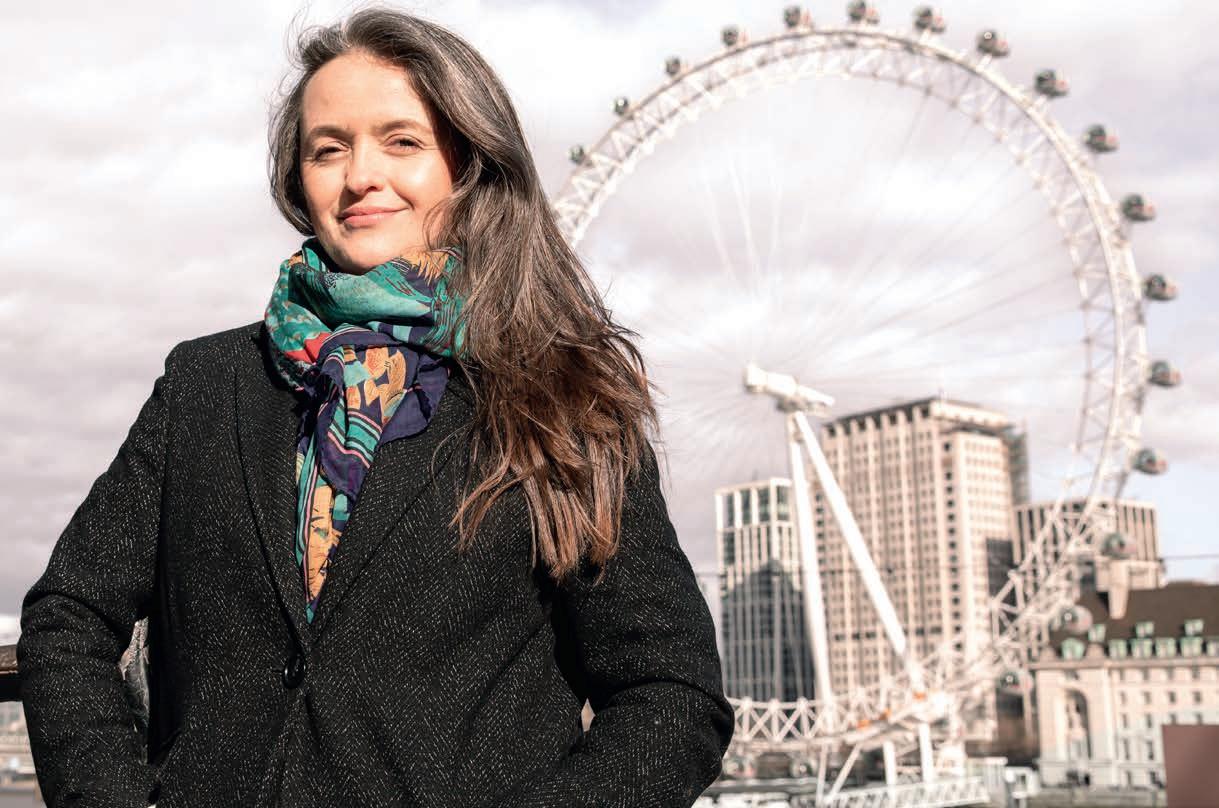
My research is about early warning and early action in situations of conflict. There are many people in many countries impacted by armed conflict. Their conditions are very different and very vulnerable. They have to deal with disrupted networks and infrastructure, displacement, physical illnesses and injuries, mental strain and so on. At the same time, the likelihood of disasters impacting these communities is increasing due to climate change. I therefore want to know how we can support these communities with early warning systems. I’m trying to understand the interaction of climate and conflict, and pinpoint the gaps of early warning systems in this context. There is currently a research gap when it comes to this topic. There are a lot of papers about hazards but not in connection to conflict impacts.’
MORE IMPACT
‘My PhD research is directly linked to practise. I can pass on my findings immediately, give trainings and directly influence humanitarian actions. I don’t have to wait to publish papers and present my findings at conferences. This opens doors to a lot more impact. My job at Red Cross and my PhD research go hand in hand. It’s very unusual to have this opportunity and I’m very grateful to the Danish Red Cross for supporting my research. It would be impossible to do otherwise.
Time is my main challenge. I wish I had more time to be involved at the UT. I’m based in London and it can be difficult to not be on campus, not having direct access to colleagues. At the same time, I have received a lot of support from the university. I love doing a PhD. I love reading, writing, thinking. I’d do it all the time if I could. But I also have two daughters and a husband, so time is definitely a challenge. I often do my PhD research on Sundays, when my husband takes the kids out to play.
I’m so incredibly grateful to the UT. Doing a PhD this way is probably the only way for me to achieve this goal in life. The fact that the UT invests in people like me is quite special. Doing a PhD when you already have an advanced career opens so many doors. You can shape how you think, how you analyse things, be more effective. Being able to learn about the scientific process and directly apply it – it’s so incredibly impactful.’ •
31 04 • 2023
‘EXPERIENCED LIFEGUARDS HAVE EYES IN THE BACK OF THEIR HEADS’
LOCATED DEEP INLAND, FAR FROM ANY COAST, IS THE ONLY STUDENT RESCUE BRIGADE IN THE NETHERLANDS, RESCUE BRIGADE ENSCHEDE. AS A SPECIAL BRANCH WITHIN SWIMMING AND WATER POLO ASSOCIATION PIRANHA, THE BRIGADE PRACTICES AND PATROLS ALL OVER THE NETHERLANDS, WITH RECREATIONAL PARK HET RUTBEEK AS ITS HOME BASE. HERE FOLLOWS A REPORT ON ITS ACTIVITIES AT THE RECREATIONAL LAKE.
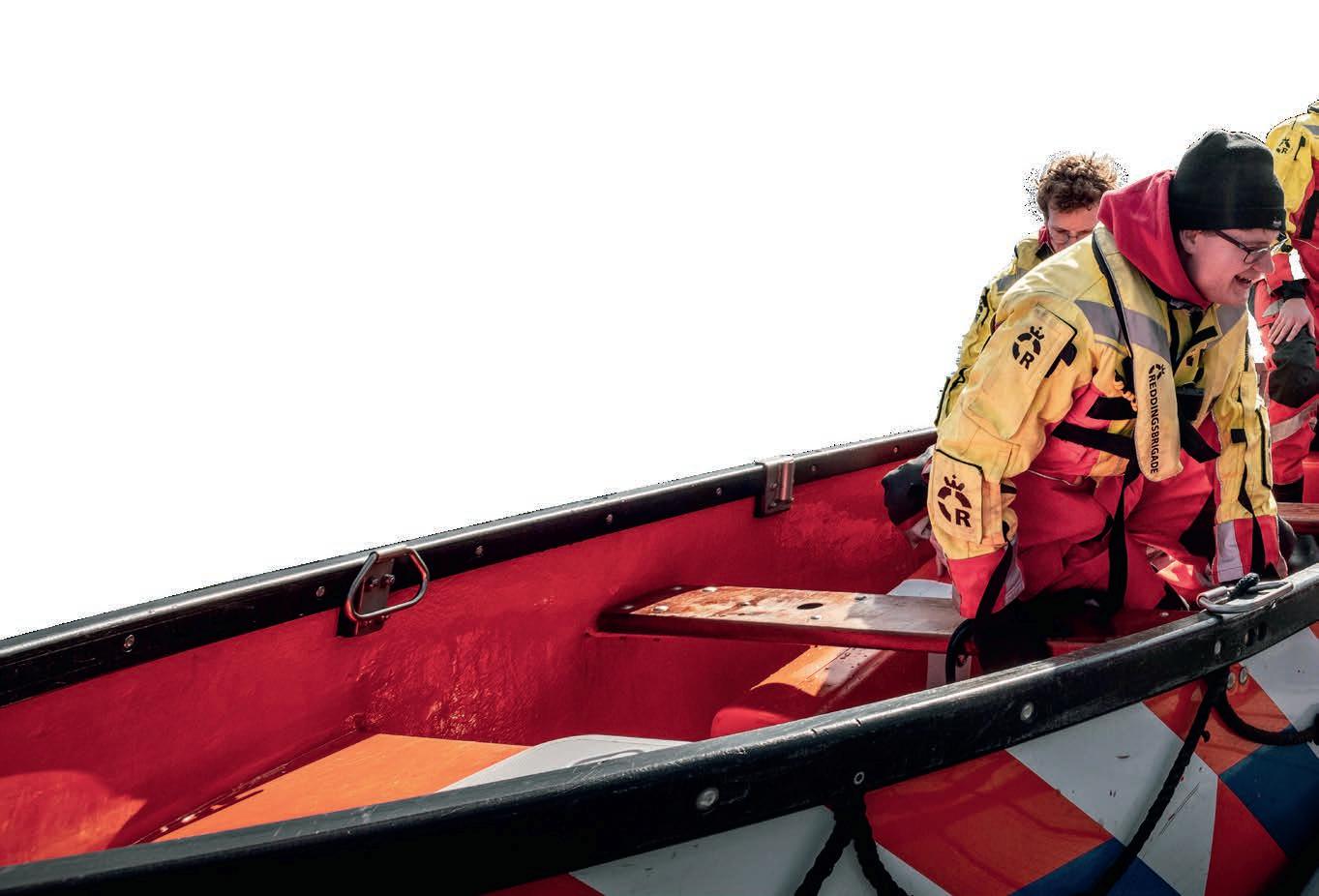
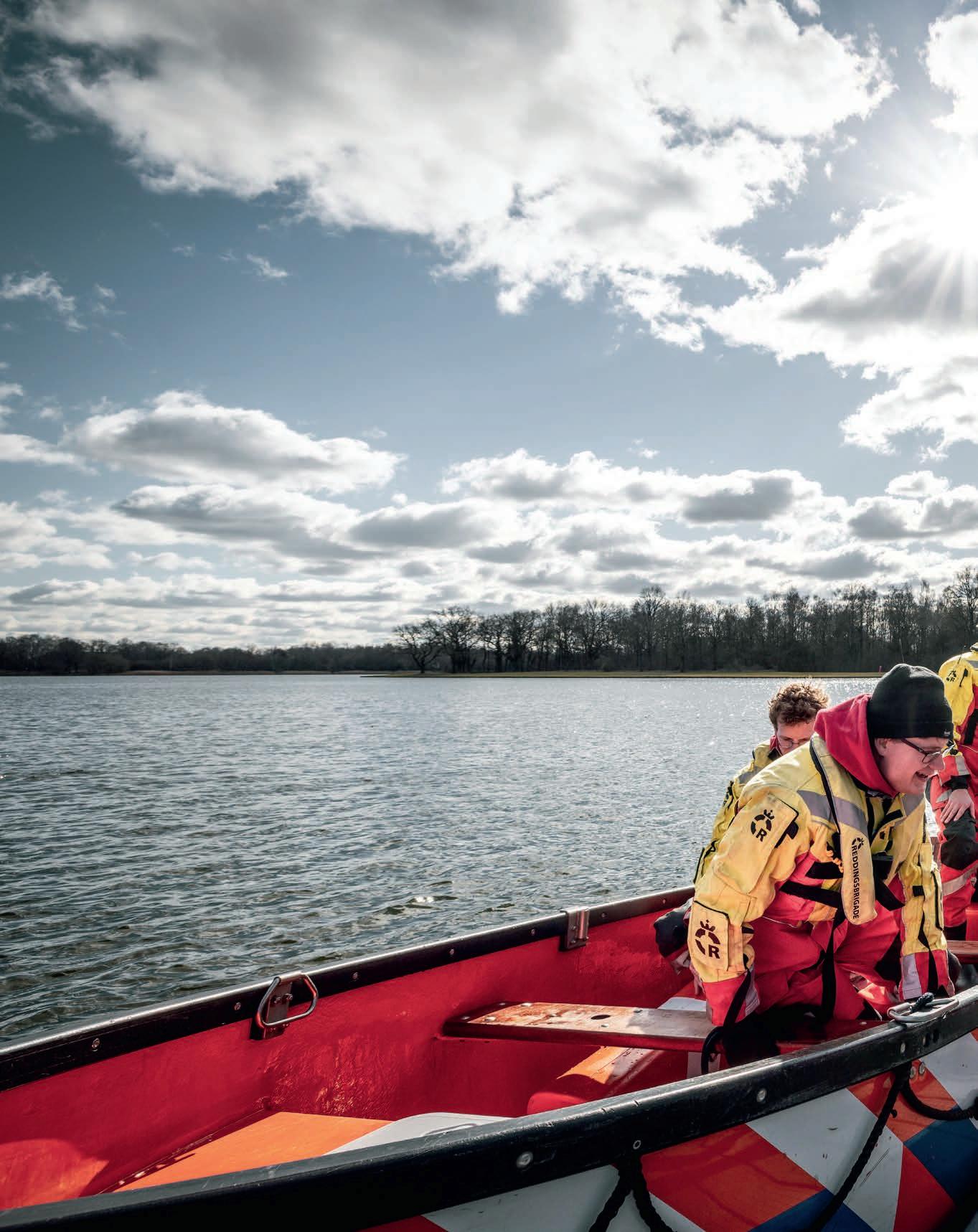
STUDENT LIFE Photos: Rikkert Harink Text: Rense Kuipers
32 CAMPUS
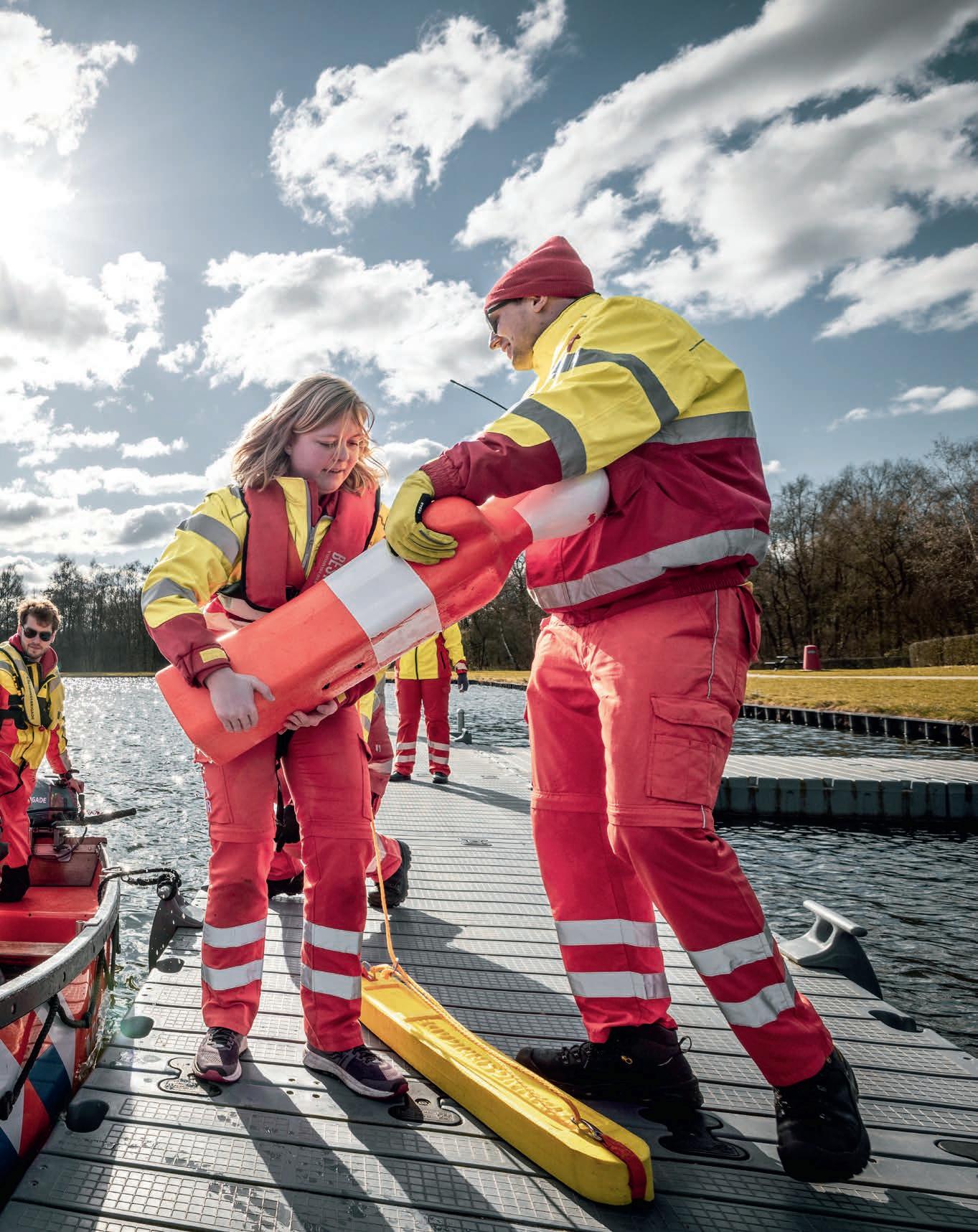
04 • 2023
Sunday morning at Het Rutbeek: a gentle spring sun replaces the night frost and Rescue Brigade Enschede is preparing for a series of practice drills. The life vests, rescue tubes, stretcher and emergency blankets are at the ready. The designated volunteer victim, Teun van Wershoven, searches for his spot while the brigade prepares for the drill scenario. ‘Where is our fake first aid kit?’, someone grumbles, as the hand-held radios are handed out. ‘Help! Help!’, someone is crying out. It’s two open-water swimmers shivering from the cold as they brave the Rutbeek lake and play a joke on the students. ‘Usually when they yell like that, it’s not all that bad,’ says Danny Verpoort, one of the most experienced members of Rescue Brigade Enschede.
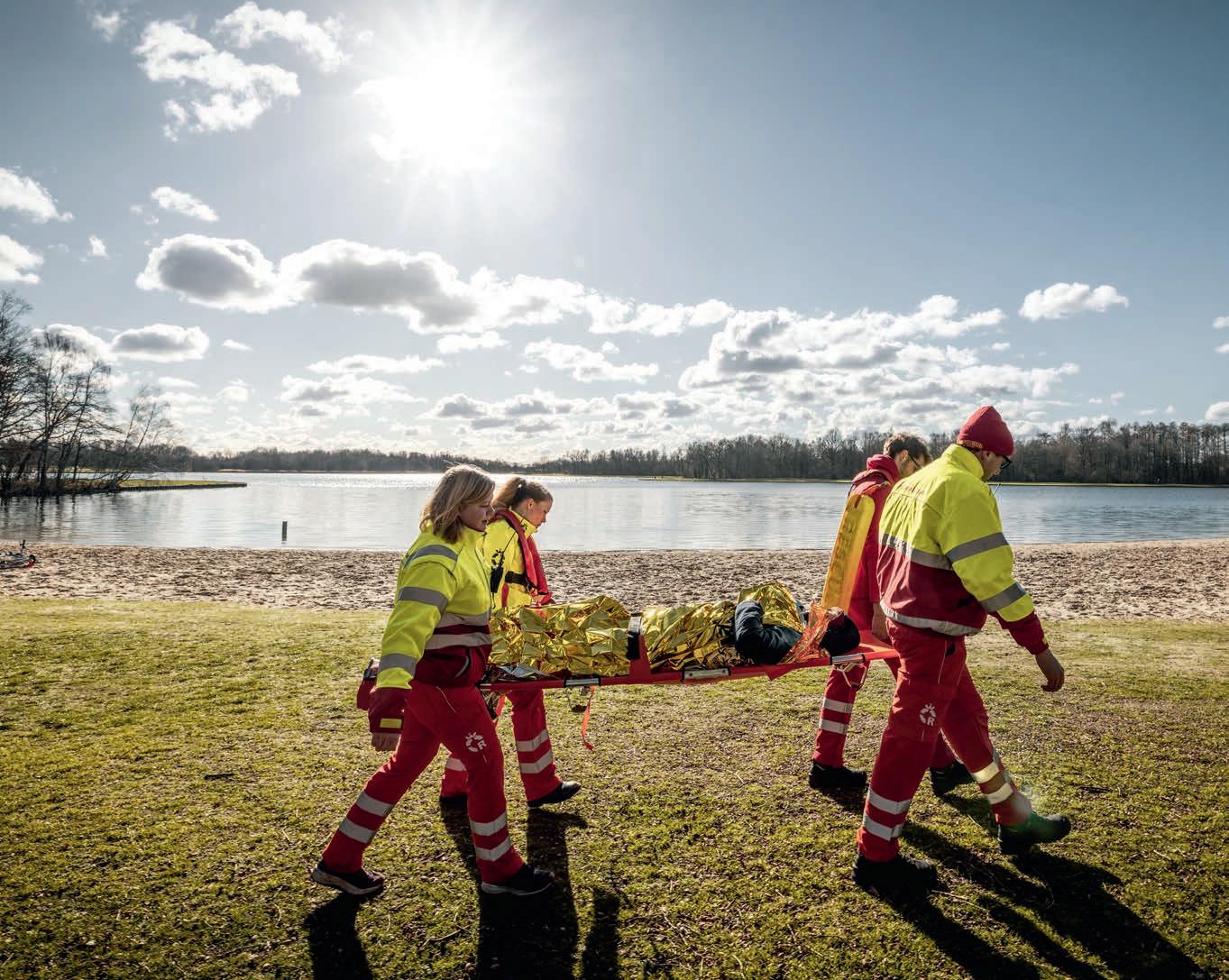
ETHER DISCIPLINE
As the brigade splits up into pairs and a ‘CP’ - central post - team 1-13 encounters the victim. ‘A man in his twenties, about thirty metres away from the toilet block. Fell off his bike. Has no medication or underlying conditions and is responsive. Over.’ Immediately it becomes clear that there is no lack of radio discipline.
After consulting with ‘CP’, team 1-12 rushes in with the stretcher to transport the victim. The latter’s acting performance puts the brigade to the test: first he briefly loses consciousness, then he cries
out as he is lifted onto the stretcher. But it’s no match for the brigade’s professionalism. With the victim wrapped in two emergency blankets, the team of four transports him to the central post on foot, all the while asking questions about his condition. First the inside leg, then the outside. Inside, outside. Inside, outside. A well-oiled machine.
EYES IN THE BACK OF YOUR HEAD

It is time for the next drill: ground searching. Given the temperature, it is going to be a dry rescue today. As the brigade scours the beach, Van Wershoven walks over to talk to us, as a spectator this time. ‘I stayed out late last night, so I was quite comfortable just then,’ he says with a wide smile, before explaining the drill. ‘Under warmer conditions, we do the drill in shallow water. It’s a well-proven way of finding missing children or pieces of jewellery for example. Yes, you heard that right, children. One of the first things we learn during lifesaver training is that children can drown even in shallow puddles of water. Our more experienced lifeguards in particular have eyes in the back of their heads.’
That experience certainly doesn’t come out of nowhere, says Bram Bats. ‘We offer lifesaving training in the pool, to master the basic skills of rescue swimming. After that, you can go on to become a lifeguard,
STUDENT LIFE 34 CAMPUS
so you can provide emergency assistance on and around open water and supervise events. We even practised ice swimming last winter. And because there are so many international students at the university, we’re the only rescue brigade in the Netherlands that also offers its training courses in English.’
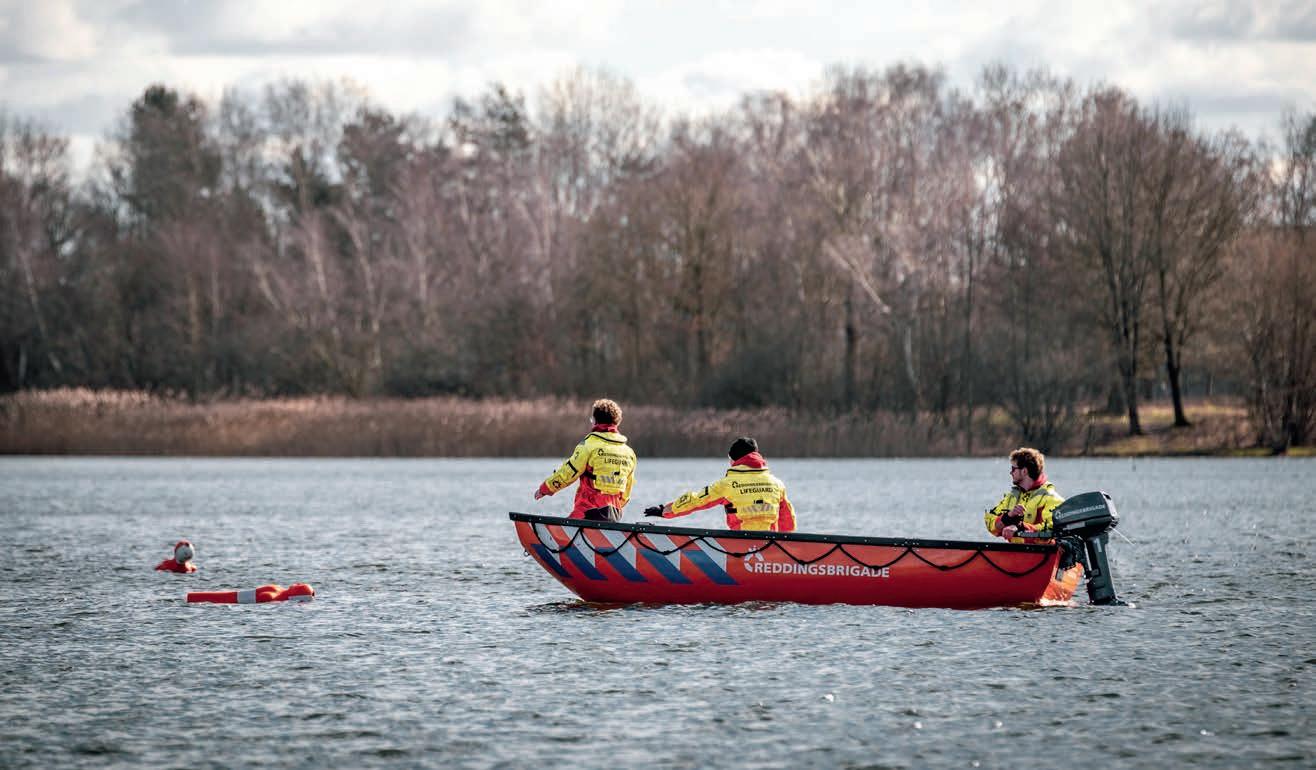

THE ODD ONES OUT
All through the year, the brigade provides first aid, surveillance and water rescue services all over the country. Ranging from St Nicholas arrival parades in winter to the lifeguard station on Texel in summer. And from the Campus Challenge of survival run association Tartaros to big festivals like Zwarte Cross and Freshtival. Some of the 40 active members even practice lifesaving as a competitive sport. ‘We’re sort of the odd ones out in the swimming and water polo association, but what binds us together is that we want to do more than just swim laps,’ says Bats. ‘And as members of the rescue brigade, we can. We have mechanical engineers among us who like to tinker with the engine of the lifeboat, technical medicine experts who are passionate about first aid and civil engineers who know all about fluid dynamics. On top of that, we all have a passion for helping people.’
FRIEND GROUP
As the only student rescue brigade in the Netherlands, there is no shortage of silly, student-like humour. This becomes apparent during
the final drills of this cold Sunday morning, when the missing child Henk (8 years old) matches the following description: ‘orange face, orange hair and a horizontal white stripe across his chest’ - the exact characteristics of the rescue manikin with an underlying heart condition that is resuscitated moments later. Next, two plastic drowning victims, both named Jelle for the occasion, have to be rescued from the water by means of the life boat.
With both Jelles brought safely ashore, Bats further explains what makes this association within an association so special. ‘The humour is part of it, of course. I don't think you’ll find hungover volunteer victims at any of the other brigades, haha. The rule of thumb is: no joking around once the drill has started. But other than that, there is plenty of room for drinks, outings and other activities. Because of this, we have an incredibly close-knit group. It often feels more like a friend group than a rescue brigade.’ •
35
04 • 2023
‘ We all have a passion for helping people ’
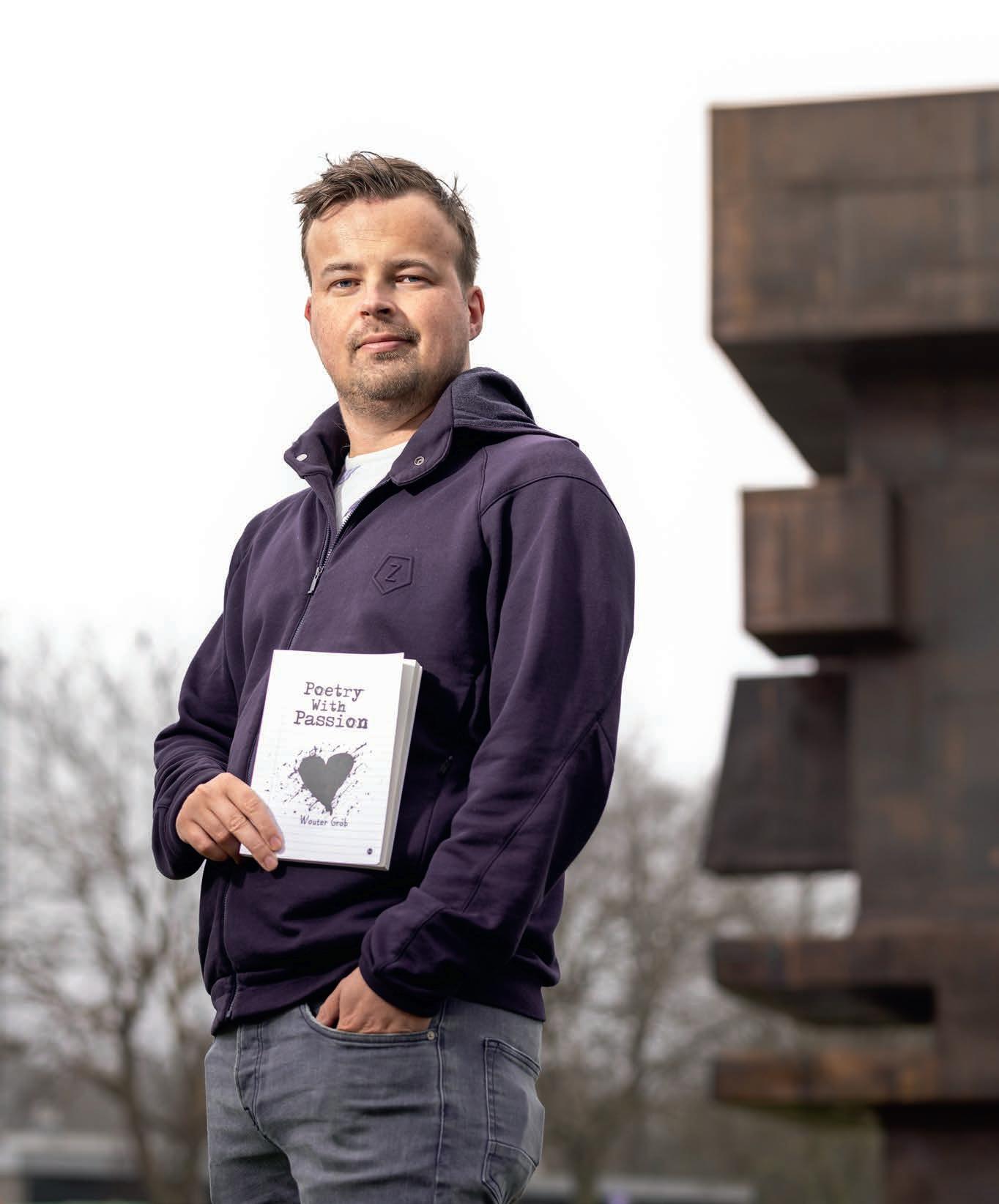
INTERVIEW
Photo: Rikkert Harink
Text: Stan Waning CAMPUS
WOUTER WRITES POEMS ABOUT HEARTBREAK, ANXIETIES AND SLEEPLESS NIGHTS
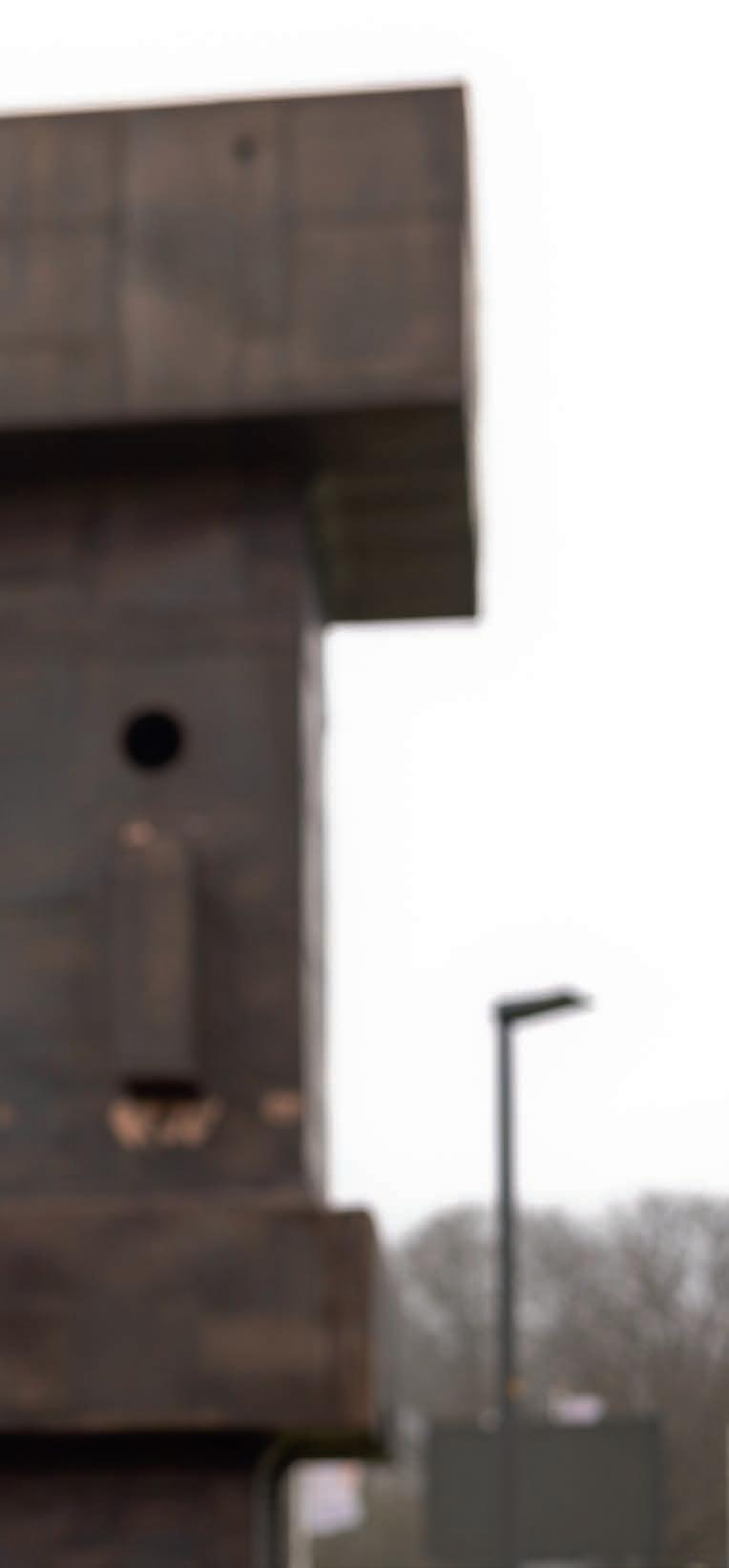
UT STUDENT WOUTER GROB RECENTLY PUBLISHED HIS FIRST POETRY COLLECTION POETRY WITH PASSION. THE MECHANICAL ENGINEERING STUDENT CREATED THIS COLLECTION BECAUSE HE HAS DIFFICULTY WITH SHOWING HIS FEELINGS AND EMOTIONS, BUT HE IS GOOD AT EXPRESSING THEM IN POEMS. THE POEMS ARE MOSTLY ABOUT LOVE, SADNESS, ANXIETIES, SLEEPLESS NIGHTS AND MENTAL PROBLEMS.
Poetry and a Mechanical Engineering programme. At first glance, they seem like two worlds that could not be further apart. Nevertheless, Wouter Grob, UT student from Almelo, devotes many hours a week to his great passions. ‘It’s an unusual combination, there’s no denying that. The contrasts are stark, but for me, they work like yin and yang. Writing down my emotions keeps me on track analytically.’
SOMETHING TO HOLD ON TO
Like many other teenagers, Grob struggled with doubts, worries and anxieties during adolescence. ‘I had trouble sleeping and couldn’t stop thinking about things at night. One day, I tried to get it all off my chest by writing a poem. That sort of got out of hand.’ When, after a few years, Grob had amassed a pile of dozens of poems, he decided to compile them into a collection. If you browse through the booklet, you will mainly find English texts written in rhyme. ‘The language and form actually came about by chance. I’m better able to express myself in English and the rhyme format gives me something to hold on to.’
Grob clearly recalls how the first poem came into being: a classic case of a lovesick teenager. ‘I liked someone but I was so shy that I didn’t have the guts to tell her. So I thought: I’ll try to do so through a poem. It didn’t work out, unfortunately. Or at least, it didn’t lead to anything in terms of romance, but I realised that dealing with my thoughts and putting my doubts aside like that gave me peace of mind.’
STUDENT WELL-BEING
The rejection was something Grob could cope with, but at that point in his life, he was struggling with bigger problems. He was suffering from PTSD (post-traumatic stress disorder) due to bullying incidents, slept little and irregularly and felt like his symptoms could not get any worse,
even though he was afraid they might. His mental issues took on such serious forms that he considered suicide. He had been struggling with his feelings for too long and did not share his fears with anyone. Now, years later, he feels a lot better, although he still has his bad days. ‘I’m at peace with the past now, otherwise I wouldn’t be so open about it.’
With his poetry collection, he hopes to give young people who are now in a similar position a sense of direction. ‘Because I know what not to do. Even though attention to student welfare and well-being is growing, I notice that talking about mental problems among young people is still considered taboo. They think they’re the only ones with depressive thoughts, but sharing your struggles with someone else is incredibly helpful. I only started working through my problems after I began writing about them.’
Reactions from friends and family to his collection are positive. ‘They think I should be proud of myself. After all, there’s a book on the table with my name on it. I’m not very extroverted, so not many people at UT know about the existence of the collection, but the fellow students who do know about it are very enthusiastic.’
Grob has no plans for the future with regard to poetry, even though he says there is enough material for a second or even third collection. ‘I'm not very marketing-savvy, so I don't think those things through enough. And it's not like dozens of my collections are flying off the shelf, although I do think the poems appeal to many students. Some poems are about panic attacks at school, being in deep trouble, stress, mental health issues in COVID-19 times. It’s recognisable to many UT students. Whatever happens, I will continue writing - no matter what. Who knows, maybe I’ll release a new collection after I graduate.’
37 04 • 2023
The roughest day
The last couple of days have been rough, but today certainly is the hardest of them all. I tried to manage all the stress but last night I lost control and took the fall. An ear infection, a course I failed and work for 3 committees got the best of me.
It ’s past noon and I haven’t left my bed in the past 14 hours, so yeah, living the dream.
I feel a tad lonesome as well, as I try to figure out what to do so I can feel fine again.
I want to leave this all-time low in the rear-view mirror, but that ’ll take some time.
I missed a class this morning, which wasn’t exactly part of the plan.
For now, I just got to suck this all up like a man and try to see the bright side of this downtime.
This evening I’ll go to swim practice after which I’ll call a friend.
It ’s time to admit that I can’t hold this in and that I really need to vent.
After that I’ll crawl into bed to get some rest, because I need to get back in this fight. And when I wake up tomorrow I’ll get to work making things right.
WHERE CAN YOU TURN TO AS A STUDENT WITH MENTAL HEALTH COMPLAINTS?
UT has stated that students are not always aware that they can turn to their student adviser for problems that are not studyrelated. The student adviser can act as a gateway to UT's different forms of help, for example to help students struggling with a lot of stress. Students can learn how to deal with stress during the stress management workshop, developed by UT student psychologists.
These same tips apply to students who feel dejected or anxious. There are also opportunities for students who feel lonely to get in touch with fellow students, for example by joining a student or study association. Additionally, student psychologists offer a “Look after your friend” training, in collaboration with the Student Union.
There is also an option to talk to a Confidential Contact Person (CCP). CCPs are UT students from different programmes and backgrounds who are trained peer listeners and work in complete confidentiality. Practical tips and advice on how students can deal with feelings in a healthy way are available on UT's Student Wellbeing Canvas Platform.
If you have suicidal thoughts, you can talk anonymously via the chat on www.113.n l, you can call 113 (usual telephone costs) or 0800-0113 (free). •
38 INTERVIEW
CAMPUS
Wouter Grob - Poetry With Passion is available via Boekscout or in bookshops at €17.99.
TINKY WINKY AND SEX
I’m cycling from Enschede towards campus through the Pinetum. One of my all-time favourite places: a rolling landscape with a collection of conifers from all continents and a winding bike path that leads from the busy Hengelosestraat to the university’s almost car-free grounds. A powerful spring sun colours the grass bright green. And suddenly, Po, Laa-laa, Dipsy and Tinky Winky come to mind. The Teletubbies. Four puppets in a green field that bears a strong resemblance to the Pinetum. Dutch television began broadcasting this BBC series in 1998, right around the time when I had young children. When I was tired from feeding them, reading them books or taking them for a swing on the playground, I would put my daughters in front of the TV screen and plop myself down on the sofa. There was nothing better than watching a rather dull programme in which the four Teletubbies were just frolicking around. They produced unintelligible, soothing sounds. Every now and then, a video would play on a screen on their bellies, rabbits nibbled on a blade of grass, and the sun was a smiling baby face. All in all, everything was zen. The programme was aimed at toddlers and preschoolers, up to the age of three or so. But it was also an easy watch for exhausted parents.
Soon after the series was first broadcast, it was met with criticism from right-wing Christians. A US television evangelist painted Tinky Winky in a suspicious light. The puppet was allegedly homosexual. He was said to lead young children down the wrong path of male love through his purple colour and red handbag. Those ideas were adopted by others, including Dutch and Polish conspiracy theorists. The puppets may seem innocent enough, but they incite immorality. Such theories about alleged conspiracies are of all times. A few examples: Rome, the
beginning of our era. The city goes up in flames. The Christians were accused of setting the fire. Unsubstantiated, but a persistent view. Or take, for example, the Medieval notion that certain women were witches, ate the flesh of children and transported themselves on a flying broomstick. Only when reduced to ashes at the stake, were they proven innocent. A more recent example: COVID-19 was invented by a secret elite intent on seizing power by means of the pandemic.
Back to Tinky Winky. To me, the puppets were gender-neutral beings. Not men, not women, not anything. No genitalia, breasts or nipples could be discerned either. An innocent puppet show in an eversunny world. But conspiracy theorists marred this innocence. No longer a character with certain characteristics, Tinky Winky is now defined by a sexual orientation. Pigeon-holed. I find that problematic about the current gender discourse. Are you LGBTQIA+ or something else? To me, you’re a fellow human being. And your sexual orientation is an important aspect of that, even part of your identity; but aren’t you more than just that? I would like to know what you’re passionate about or irritated by, what you find beautiful or ugly, what your ideas are about life, about science, what your backstory is and how you envision your future, who you love and who you don’t care about. In short, who are you? •
Hiska Bakker Historian, journalist and presenter at Studium Generale
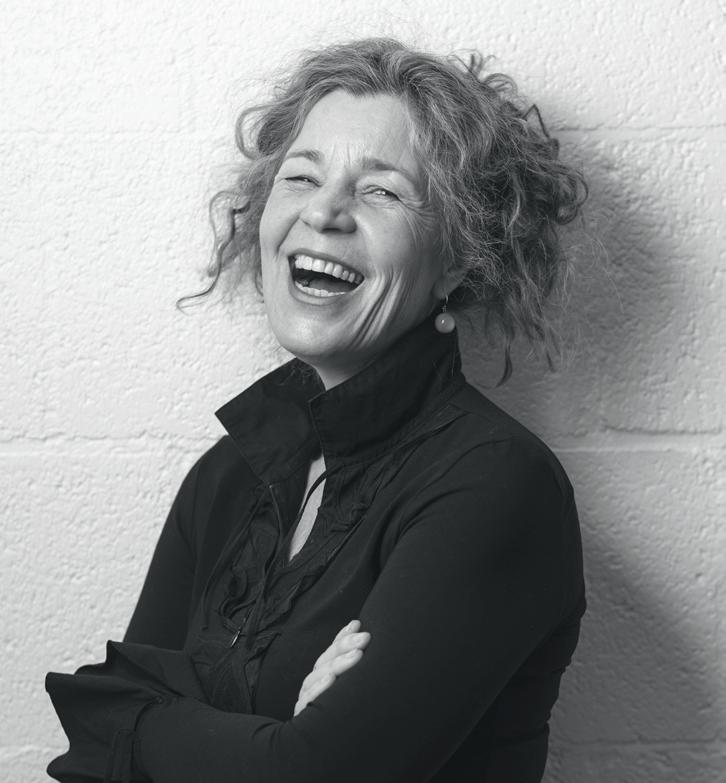
COLUMN
39 04 • 2023
Photo: Rikkert Harink Text: Hiska Bakker
UT’ERS ON THE MOVE
1997
ERMS SURIPATTY PA
As of January 2023, Erms Suripatty is working as an independent advisor at AkzoNobel in the position of Lead Digital Strategy & Governance. Suripatty graduated in Public Administration at the UT in 1997 and gained a lot of experience as a management consultant at Accenture and PwC, after which he helped various companies with digital transformations as an independent consultant in the field of portfolio, program and project management. •
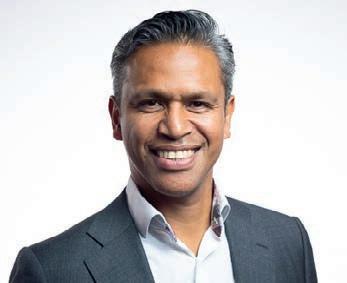
2004
WOUTER VAN RHEENEN BIT
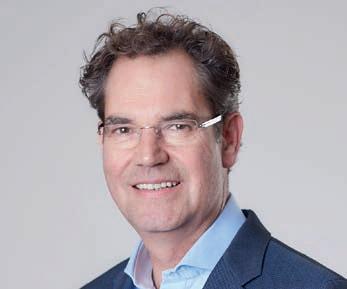
Wouter van Rheenen started working at ASML in February 2023, in the role of Chief Product Owner Data & Analytics. Van Rheenen graduated from the UT in 2004 with a degree in Business Information Technology. He then worked for almost 15 years in various positions at ING, including a time in Seoul in South Korea, and also several years at Basecone in Hoevelaken. •
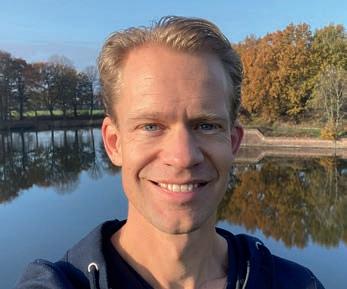
1990
FRANK VROLIJKS PA
In January 2023, Frank Vrolijks started as General Director of ESG|Tech. ESG|Tech consists of various companies with a role in the development and management of real estate. In addition to his new position, he has also been active on the board of the Twente University Fund for some time. Vrolijks graduated in Public Administration in 1990. In his student days he was chairman of the executive board of the campus council. •
2017 1998
MIKAEL KRISTYAWICAKSONO CREATE
MARIELLE VAN DE MERBEL BIT
NGUYET TRAN BA
Nguyet Tran started in February 2023 as a Product Analyst at FinTech platform Adyen in Amsterdam. Tran finished her study in International Business Administration at the UT in 2022. She then started working at the ACT Commodities Group as a Junior Sustainability Analyst. • CAMPUS
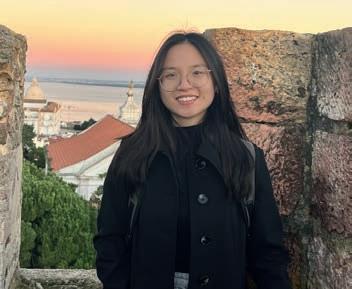
In February 2023, Mikael Kristyawicaksono started as Hardware Engineering lead at DELOS in Jakarta, Indonesia. DELOS is an aquatech company that, based on science, aims to disrupt the traditional aquaculture industry in Indonesia, with eyes on South Asia as a whole. Kristyawicaksono graduated from UT in Creative Technology in 2017. •
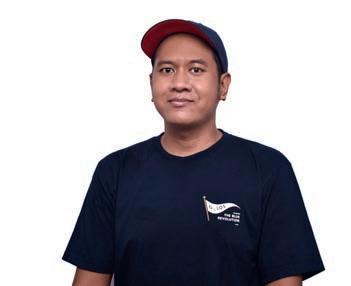
In January 2023, Marielle van de Merbel started her own business as 'the Organization Doctor', her first assignment being Senior Manager Legal Service Center at DAS. This closes a period of more than 11 years at a.s.r. insurances, where she held the positions of deputy director innovation & digital and director a.s.r. Vitality. Van de Merbel graduated in 1998 in Business Information Technology. •
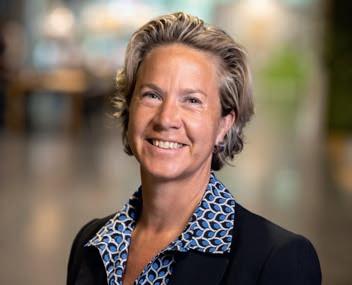
40
2022
ALUMNI NEWS
THE DUTCH ENGINEERS ALUMNI NETWORK
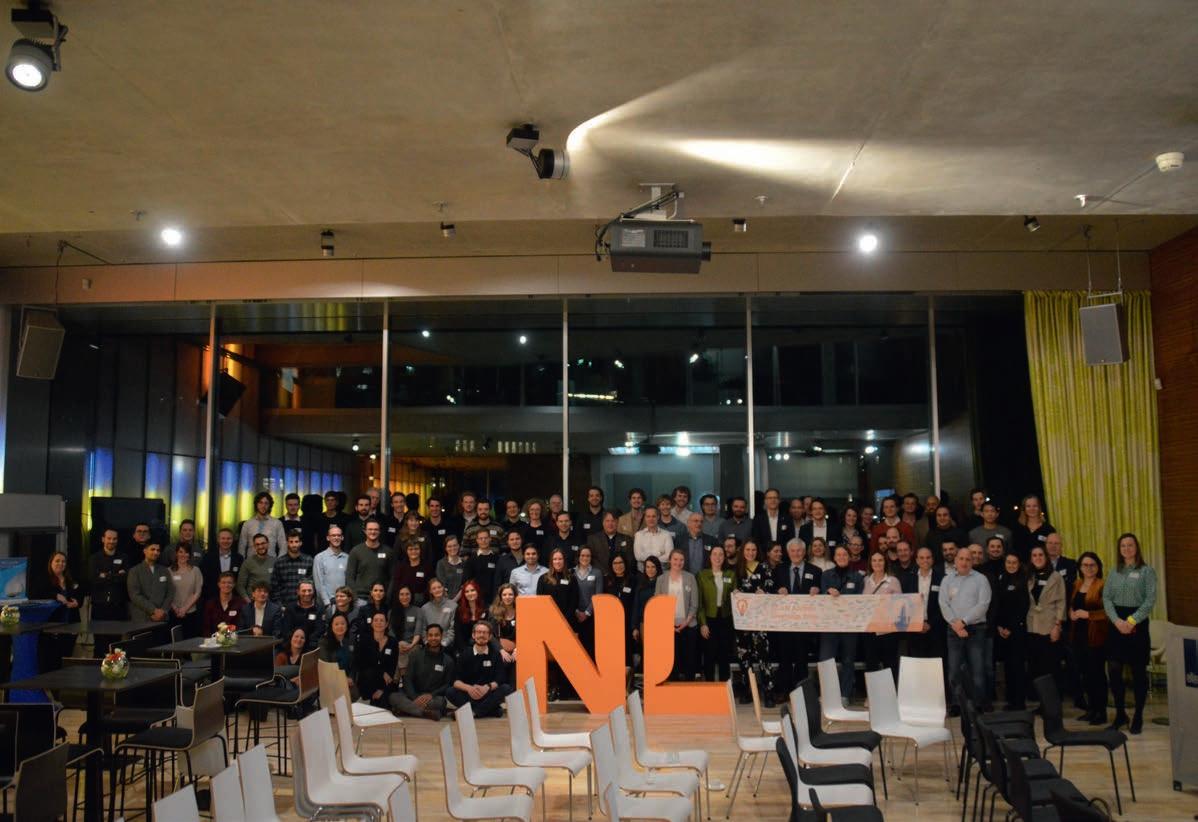
THE DUTCH ENGINEERS ALUMNI NETWORK, DEAN FOR SHORT, HAS A PACKED CALENDAR FOR 2023. IN FEBRUARY AND APRIL, EVENTS WERE HELD IN BERLIN AND AT VARIOUS LOCATIONS ACROSS THE UNITED STATES. NEXT UP FOR THE COMING MONTHS ARE THE UK, SWITZERLAND AND FINLAND.
The 4TU DEAN alumni network was launched in 2014 and currently operates in Australia, Canada, France, Germany, Scandinavia, Spain, Switzerland and the US. This unique network includes more than 33,000 alumni and attests to the global impact and reach of the four Dutch technical universities: TU Delft, TU Eindhoven, Wageningen University and the University of Twente. Events are often organised in cooperation with partners such as the 4TU Federation, the Netherlands Enterprise Agency and the Ministry of Foreign Affairs.
Curious about what such an event looks like? Read a report of the successful event at the Dutch Embassy in Berlin on the right.
‘Full house’ at the alumni event on Tuesday, February 7. Around 90 local alumni from the 4TU universities participated in the first DEAN event of 2023. Under the theme ‘Alumni Shaping the Future’, three alumni speakers - Gigi Laan (TU Delft), Andrew Shamu (TU/e & UT) and Pavlos Kalaitzoglou (WUR) - spoke to the audience about sustainability and innovation in their work. The location of the event was the Dutch Embassy in Berlin. Mia Woldberg, Deputy Ambassador of the Netherlands in Germany, gave the opening speech, emphasising the importance of alumni networking, not just for the alumni themselves in their professional lives, but also for society. She stated: ‘This is how new opportunities for collaboration, inspiration, innovation and growth are born.’
A team of local alumni volunteers are already planning and organising follow-up events in Berlin. Would you like to know more about DEAN? Visit https://www.4tu.nl/en/about_4tu/alumni/
41 ALUMNI NEWS
Twitter: @alumniUTwente Facebook: Alumni Universiteit Twente Instagram: @alumniutwente SOCIAL MEDIA
04 • 2023
Photo: Jenny de Jong Text: Hilde Luiten
TEAM UP FOR TALENT!
SUPPORT OUR ANNUAL CAMPAIGN 2023
MORE THAN 300 DONORS HAVE ALREADY PRECEDED YOU YOUR DONATION COUNTS EVERY SINGLE YEAR
SUPPORT OUR HEALTH RESEARCH
Prof. Dr. Jai Prakash, Engineered Therapeutics
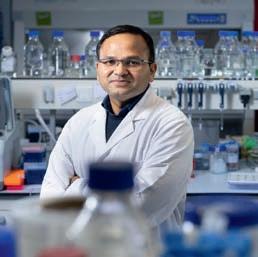
SUPPORT SUSTAINABLE TRANSPORT
Kirsten Bouwman, Student Industrial Design, Team Manager Solar Team Twente
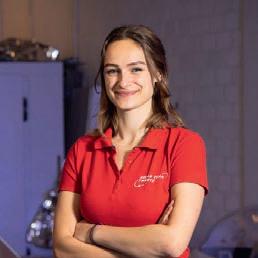
INCLUDE THE UNIVERSITY IN YOUR WILL
Even when you are no longer around, you could benefit future generations at the University of Twente. By leaving a gift to the University Fund in your will, you will enable new generations of students to flourish and our research to provide a valuable contribution to society. Considering leaving money to the University Fund in your will? We would be happy to discuss the possibilities with you. •
For more information: www.utwente.nl/en/ universityfoundation/ donate-folder/leaveagiftinyourwill/
DONATING WITH TAX BENEFITS




Do you donate to the University Fund annually or are you thinking of doing so? You can easily enjoy a tax benefit by making your donation a periodical gift. Doing so will allow you to raise your contribution without spending any extra money. •
For more information: www.utwente.nl/en/ universityfoundation/ donate-folder/periodic-donations/
SUPPORT EQUAL OPPORTUNITIES
Omar Bahig, Biomedical Engineering student from Yemen
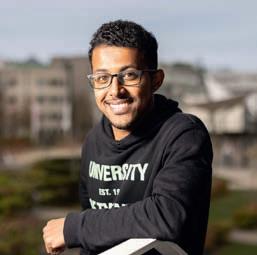
SUPPORT A GREEN CAMPUS
Joris Harbers, student Technical Medicine, Student Union
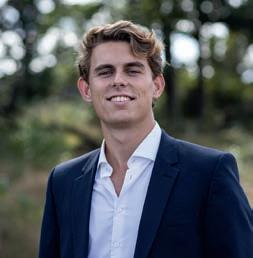
POWERED BY UNIVERSITY FUND TWENTE

From the Batavierenrace to theatre and sports. From intimate readings and huge parties to conferences and symposiums. Two examples of events in the past few months that have been supported by the fund.
On 14th of January, the Association of Chinese Students and Scholars in the Netherlands, Enschede department (ACSSNLEnschede) organized the Spring Festival: the Chinese New Year Gala. This gala is not only held for Chinese students and employees, but also aims to give everyone a chance to get acquainted with Chinese culture. In total there were about 300 guests, including the ambassador of China! •
In January, 18 students of International Business Administration and Industrial Engineering & Management travelled to the USA. The focus of this study trip, organized by Stress, was the question 'How does data-driven decisionmaking influence the functioning and performance of companies in the USA in the field of sustainability goals?'. The students visited many companies to find an answer to this question. •
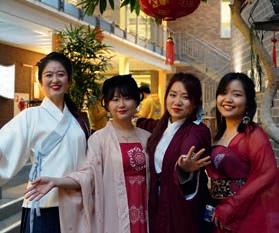
TWENTE UNIVERSITY FUND
42
CAMPUS
FLORENCE METZ WINS PROFESSOR DE WINTER AWARD 2022
Florence Metz, who has worked as Assistant Professor in Governance Resilience of BMS’s section on Governance and Technology for Sustainability (CSTM) since April 2020, wins the Professor de Winter award for her publication Metz, F. and Brandenberger, L. (2022), Policy Networks Across Political Systems, in the American Journal of Political Science. The prize will be awarded during the DIES Natalis on May 12, 2023.
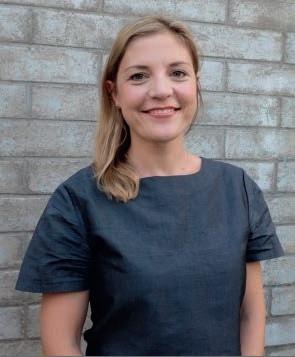
Metz’s research is embedded within the broader theoretical questions of public policy research. In the face of unprecedented crises, such as climate change or COVID-19, governments and their public policies play a key role in supporting societies in their transitions to become more resilient. The question of how governments handle and prepare societies for abrupt shocks, but also gradual stresses or technological innovation, is central to her research. Her conclusion is that ‘the political system of a country is one key political factor promoting transitions. Political systems institutionalize relational patterns among the actors participating in policymaking processes and thereby enable (or constrain) transition pathways.’ The jury was taken by the relevance and good methodology of the research, being a good mix of theory and methodology. ‘Good quality, original and convincing,’ the jury added.
The Professor De Winter Prize is intended as recognition for excellent scientific talent and as an incentive for the further development of a scientific career. The prize is awarded annually from the Professor De Winter Fund, a named fund set up at the Twente University Fund by the late Mrs De Winter. After her death in 2013, her heirs, UT alumnus Henk Hoving and his partner Thijs van Reijn, decided to continue the prize. This is the sixteenth prize awarded. •
STUDENT KOEN HASPERHOVEN IS NEW BOARD MEMBER OF UNIVERSITY FUND
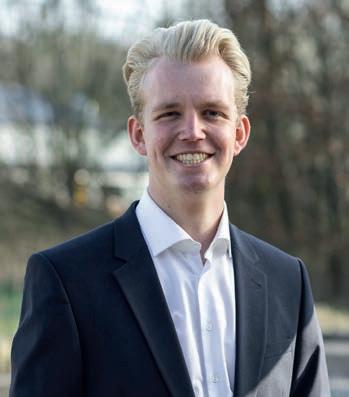
Master's student of Industrial Design Engineering Koen Hasperhoven is active in student life in addition to his studies. In the year 2021-2022 he was the chairman of the Student Union and with this experience in his pocket he would like to continue to work for his fellow students. Koen is excited to make the student's voice heard within the University Fund Board. ‘I also find it a challenge to contribute to supporting and strengthening the broad UT community from this new role.’ •
The Twente University Fund has officially been classified as a charity by the Tax Administration. The Foundation has been given the status of ANBI (Public Benefit Organisation, PBO). This means that donations to the fund are tax deductible under certain conditions. Visit our website at www.utwente.nl/ufonds for more information.
Contact: Maurice Essers, director: 053 489 3993 or m.l.g.essers@utwente.nl


43 04 • 2023
‘AS A UNIVERSITY WE SERVE THE WORLD’
WHAT DOES ‘SHAPING 2030’ MEAN FOR THE STAFF OF THE UNIVERSITY OF TWENTE? IN A SERIES OF DOUBLE INTERVIEWS, TWO PROFESSIONALS SIT DOWN TO TALK TO EACH OTHER ABOUT THAT. WHERE DO THEIR ACTIVITIES OVERLAP? HOW DO THEY DIFFER? WHAT CAN ONE LEARN FROM THE OTHER AND VICE VERSA? IN THIS EDITION: INTERVIEWER FRANK HALFWERK AND HIS INTERLOCUTOR PAUL HAVINGA, BOTH FULFILL A DUAL FUNCTION: THEY WORK AT THE UNIVERSITY AND AS RESEARCHERS IN PRACTICE.
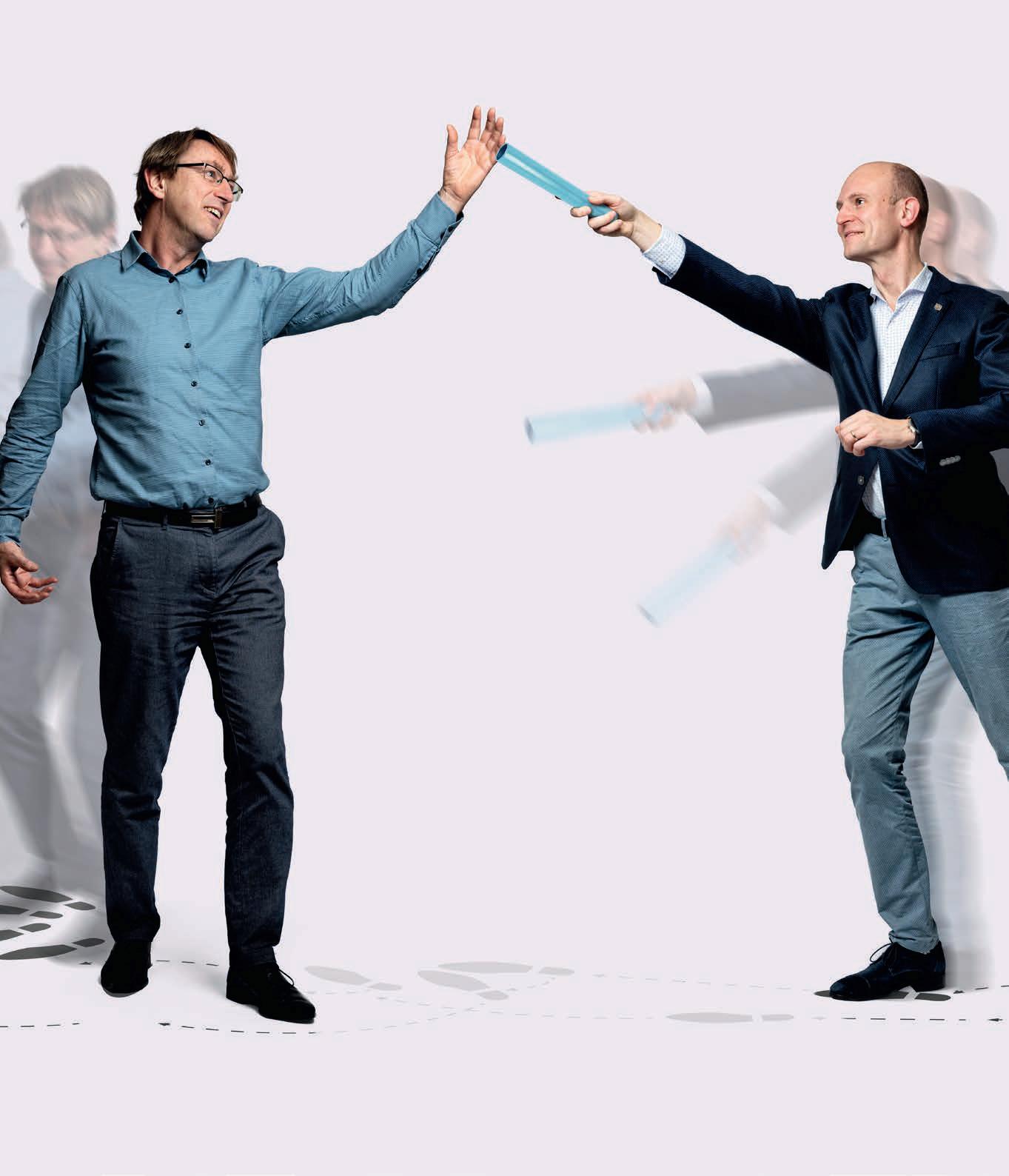

DOUBLE INTERVIEW Photo: More Text: Einder
FRANK HALFWERK (1989) works at Medisch Spectrum Twente (MST) as a technical physician and as Assistant Professor at the UT.
CAMPUS
PAUL HAVINGA (1962) is professor in the Pervasive Systems department at the UT and Director Science at TNO-ICT.
Frank: ‘We’ve both been walking around UT for years now, but I don't think we've ever met. Tell me Paul, what exactly do you do?’
Paul: ‘You’re right. Quite striking, actually! I’m a professor in the Pervasive Systems department, part of the EEMCS faculty. We measure with smart sensors, look for ways to transfer that data via wireless communication, and analyse the data. So it’s very diverse.
Topics can be anything. You can make measurements in the field of agriculture and biodiversity, but also in your body, in the sea or in factories. You encounter many practical and fundamental problems there that must be solved. But in the end, it all comes down to this: we want to know what’s happening now, so that we can make processes better or more efficient.’
Frank: ‘Do you have an example of such a process?’
Paul: ‘Some time ago we did a project on predictive maintenance. We worked with energy harvesters, among other things. These are devices that generate the energy they need themselves. With solar cells, wind energy or through movement, for example. Such devices can run on their own, without a power cord or batteries.
At a trade fair, I met an entrepreneur who developed energy harvesters based on metal springs with a coil. When such a spring starts to move, you get energy. Nice system, but nobody wanted to buy these things. My colleagues and I then came up with the idea of placing such a device on train wheels.’
Frank: ‘Of course, those are constantly moving...’
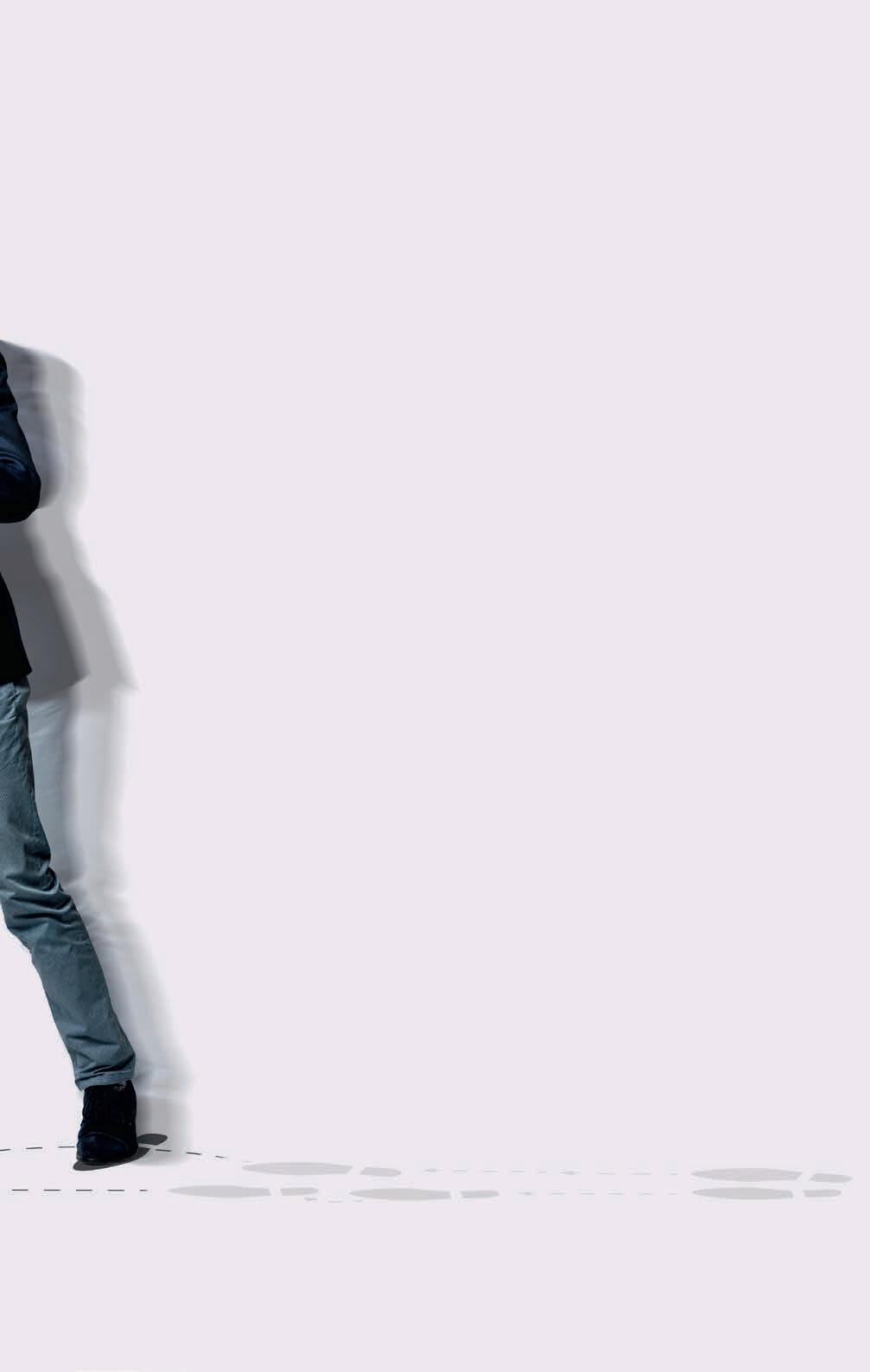

Paul: ‘Exactly. Train wheel bearings – metal cylinders in the axle of the wheel – must be checked regularly. Because if such a bearing breaks, major disasters can occur. We built a system that generates energy from the vibrations of the moving train. The device then analyses those vibrations to detect wear. If something’s wrong, a signal is automatically sent to the repairman.’
Frank: ‘How clever! That saves a lot of check-ups.’
Paul: ‘Yes, you no longer have to inspect all trains every few months. And they always stay safe. The profit for users is therefore enormous. While the project was still running, thousands of devices were already sold to British railways.’
Frank: ‘I saw that in your career you’ve always had ties to the corporate world. You also work partly at TNO. Coincidentally, I also have such a duo position, at UT and Medisch Spectrum Twente. What drives you to seek out the connection with the professional field?’
Paul: ‘I think the things we do at UT are of great value for companies. In fact, as a university we serve the world. It’s important that we provide education and conduct research that has an impact and may ultimately have practical benefits. TNO has a similar goal, albeit on a somewhat shorter timeline.
Another factor is that I want my team members to see results from their work. I think it’s important that research doesn’t end up in a drawer, but finds its way in the form of concrete products. You can set up a spin-off company, for example, which we’ve done several times. When a PhD candidate has that ambition, I wholeheartedly support it.’
Frank: ‘It sounds like you’re very much into innovation – inventing and improving things. Recently I discovered the word 'exnovation'. It means that you look at what’s already going well and why, so that you can share that knowledge. What do you think we’re doing well at UT?’
Paul: ‘Then the first thing that comes to mind is working in a multidisciplinary way. I’m convinced that a multidisciplinary view gives us great strength as a university. It’s combining different themes and expertise that allows you to make great strides. In my own work I also encounter all sorts of things that I know little about, but where I can still contribute to solving problems.’
Frank: ‘Do you have a tip for colleagues who want to learn how to work in a more multidisciplinary way?’
Paul: ‘Professionals in other fields often speak a different language than you. You should take that into account. Personally, I read a lot of newspapers and magazines. So I know what's going on in the world. In conversations, I’ve noticed that this helps me to better understand where someone else wants to go, or what problems they have. So I would say: read the newspaper, immerse yourself in the world. It's also important that you know how to sell yourself and your research. Marketing and PR are often seen as mandatory, like a necessary evil. But they’re vital. No matter how brilliant your paper is, if no one understands what your research is about, you won’t make an impact. So think about how you present your story to non-colleagues as well.’
45 04 • 2023
‘ I think the things we do at the UT are of great value for companies ’
Frank: ‘Good tips! I saw that the term ‘entrepreneurial’ is also included in the Shaping2030 vision. What lessons have you learned as an entrepreneurial scientist?’
Paul: ‘In my opinion and experience, it’s often easier to get in touch with SMEs than with large companies. Make sure you break down project into small steps, and that after a year the company has a result that they build upon. That 'something' can be very minor, but that’s how you show your added value.
It’s also important that you have a mentality of 'just doing it'. Just start, try it. Expect things to work out. If not, you’ll find out eventually. That’s the attitude I’ve raised my children with. I think it’ll get you far.’
Frank: ‘Hey Paul, you've been working here since 1985. And when I see the passion in your eyes, I suspect you're not done yet. Will we still see you here in 2030?’
Paul: ‘I think so, I feel completely at home here. Over the years it’s become increasingly clear to me what I like to do most: solving problems. And I have every opportunity to do that at UT.
The issues I work on have changed over the years. We used to mainly work with the regular industry, but now we’re increasingly moving towards sustainable matters. We’re working with Naturalis on a project on biodiversity, for example.’
Frank: ‘This conversation is the conclusion of the interview series about Shaping2030. As I look to the future, I hope we can maintain the sense of community. When colleagues from the hospital visit the campus, I always hear: wow, this place beams positive energy. What do you hope UT will look like in 2030?’
Paul: ‘I completely agree with you. Our campus distinguishes us from other universities. Since you don't just come here to work and study, but can also do plenty of sports and culture, people with a different mindset are united. This also strengthens our substantive work. We must continue to invest in the campus, because it brings us a lot.’
This was the last interview in the Shaping Perspectives series and has been previously published on UT's homepage. Over a period of two years, more than 100 UT people talked to each other in this series.
Because we won’t run out of stories to share and we always have something to say about or work, research, study and university, there is a sequel to these stories. A real relay baton is going around the campus. Will you be the next to receive it? Then share your story. Here is how it goes:
1. Within four weeks of receiving the relay stick, invite a colleague for coffee and talk.
2. Show the relay baton and get two free drinks at Appel's UT café in the Waaier, De Ravelijn, Lemons&Beans or Theatercafé.
3. Have a nice talk together about what you do and how you create impact.
4. Share this photo along with a super brief summary of your conversation with ihaveastory@utwente.nl
5. Don't forget to share your photo on your own social media channels, tagged with the hashtag #shareyourstory #universityoftwente.
6. Pass the relay baton to a colleague you are curious about and would like to have a cup of coffee with. •

DOUBLE INTERVIEW 46 CAMPUS
TACKLING GLOBAL PROBLEMS AT LOCAL, NATIONAL AND INTERNATIONAL LEVEL
The challenges society faces today are complex and far-reaching. More than ever, they call for the collaboration of many different, complementary stakeholders. At ECIU University, of which University of Twente is a partner, our vision is to help solve these complex challenges and make society futureproof by collaborating at local, national and international levels.
In order to realise this, ECIU University and University of Twente adopt a new approach to research, learning and innovation. We bring together students and scientists with government, businesses and citizens to identify urgent, definable problems across all societal domains, from transport and mobility to the energy transition or a smart circular economy. We then form international, multidisciplinary teams
and help to solve complex societal problems through a challenge-based approach. Do you work for a public or private organisation and would you like to make an active contribution to this new learning programme? Then we are looking for you! Marike Boertien (Novel-T, University of Twente): ‘We see challenges as an opportunity to build long-term relations within our ecosystem. Students, researchers and stakeholders working together to solve a challenge is a powerful mix of creativity and innovation and we hope you want to join us.’
WHO WE ARE
The European Consortium of Innovative Universities (ECIU)
12 universities, one open community
12 inspiring campuses in multiple European cities
12 connected regional ecosystems of universities, businesses and civic society
12 partners offering countless combinations of education, research & innovation opportunities
12 challengers of conventional thinking
One transformational approach to on- and offline education, research and innovation
We would definitely like to get in touch with you as a challenge provider
“
VISIT UTWENTE.NL/ECIU OUR OFFER
